
You are using an out of date browser. It may not display this or other websites correctly.
You should upgrade or use an alternative browser.
You should upgrade or use an alternative browser.
Tilea IC2401 (Campaign#8)
- Thread starter Padre
- Start date
Padre
Lord
With Great Power Comes Great Destruction
Winter, IC 2303-4; Somewhere underground in northern Tilea
The Clan Skryre emissary was a particularly unimpressive specimen, more like a menial lackey than the sort of skaven likely to be granted an audience with a Grey Seer. This was, however, no surprise, as the engineers of Clan Skryre were notorious for being so lost in their machines’ arcane technicalities that they gave no thought at all to their appearance, and cared little more about appropriate manners and etiquette.
Seer-Lord Urlak Ashoscrochor knew, however, that Clan Skryre’s assistance was likely to prove vital to his strategy, and so attempted to give no hint of his annoyance at being spoken to directly by what appeared to be little better than a runt-slave.
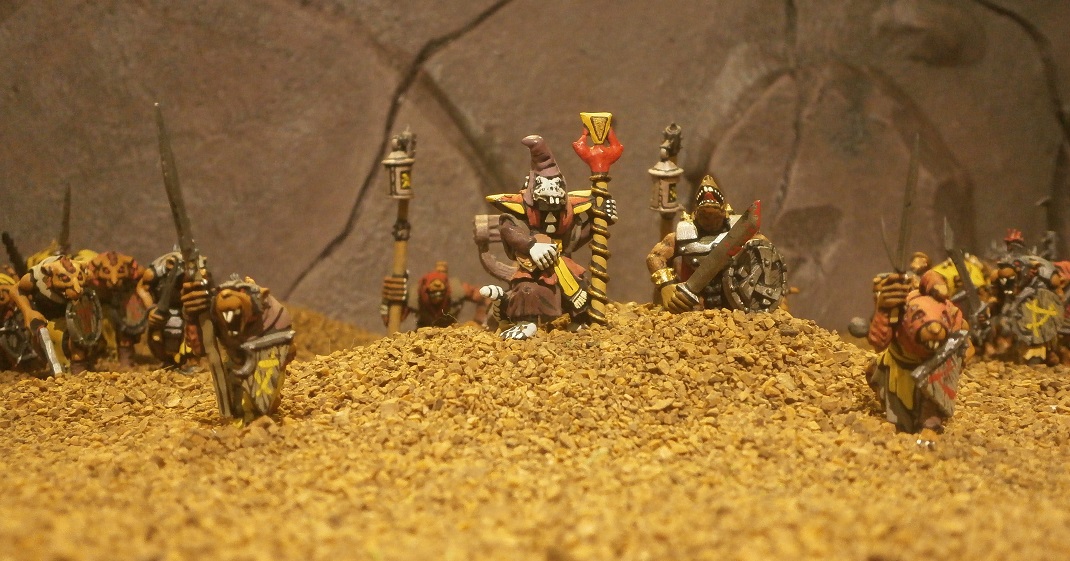
“Most high and noble Lord,” the messenger began as he fidgeted with the scroll clutched in his left hand, “I come with a great-important opportunity, offered most generous-kind to you first and fore-most before all other possible-likelihoods. My masters know full well that you will understand the potential-worth of this opportunity. They offer you a weapon more destructive than any before dream-conceived of, and yet now built-made and very real.”
The grey seer’s personal guard regiment, several companies of which were stood at the ready around the chamber, glared with apparent evil intent at the messenger.

Of course, this is nothing less than they would have done to anyone who came before them and their master, but that fact did not make the messenger any less nervous.
“Does it please you to listen-hear, noblest of lords?” the lowly engineer-apprentice asked.
"It pleases me well enough that your masters recognise the opportunity given-granted to them by my imminent victory conquests. So, speak-tell further of your masters’ offer!"

The engineer-apprentice unrolled the thick paper of the scroll and held it up fixedly as if showing something marvellous.

“I see-spy only written scrawl,” said Lord Urlak dismissively, as if put the messenger in his place. “Why show me that?”
“These are promises and guarantees!” said the messenger, a little too enthusiastically, for his voice echoed about the rocky cavern and the regimented guards noticeably flinched as if readying to attack. The messenger winced in response.
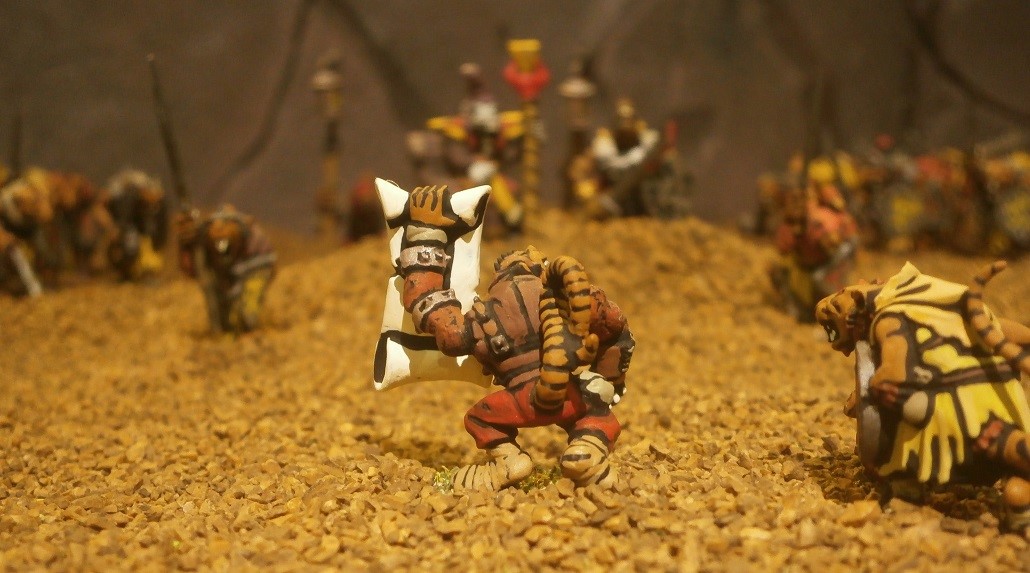
“Please, I beg-plead, forgive my loud-noisiness, gracious and noble lord,” he continued. “This is written only so that you might confirm-know I speak truthfully. My masters have put mark-symbols here that you will see-recognise and know my words to be truly theirs.”
The grey seer narrowed his eyes to subtly signal his growing impatience. The engineer-apprentice rushed to continue.
“My most clever masters offer you this novel-new weapon in return for sufficient-suitable recompense. With it, you can kill your enemies.”
“My armies bristle with weapons. I have battalion-batteries of war-engines, all capable of killing my enemies.”
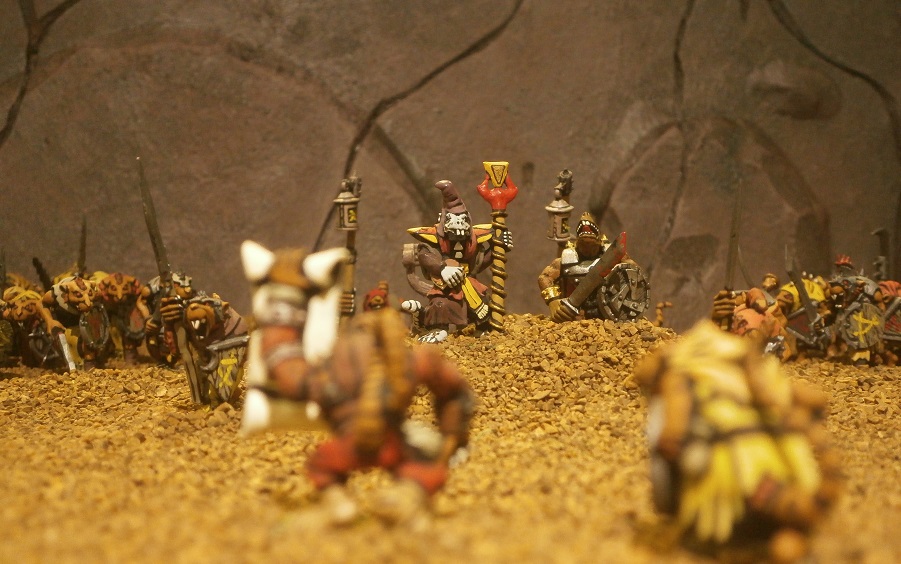
“Forgive again, most noble of lords. This kills better. This can kill all your enemies.”
"All?” said Lord Urlack. “It seems your masters have been working most busily. They have already grant-given many terrible war-engines, of which none have yet been unleashed upon my foe-enemies. When and if those machines fulfil their deadly promise then I shall already owe much to your masters …”
Here the Skaven lord fell silent for a moment, and glanced around the vast cavern chamber, as if considering who exactly was listening.

“Of course, all will be carefully weigh-measured to ensure a give-and-take most fair and satisfactory. The spoils of war will be plentiful-bounteous. We shall feast-gorge on the fat of Tilea. It pleases me that your masters appreciate my conquest is a worthy investment. So worthy that here-now they offer me more!”
“As your ally-friends, your patron-providers, they wish you to be victorious,” said the messenger.
The Grey Seer fixed his eyes upon the engineer-apprentice, as if weighing him more carefully.
“Anyone with wit sufficient knows the cunning skill of Clan Skryre,” he said. “And I do not doubt-suspect your masters’ promise-claims. And yet, I must ask-inquire, what do they mean by a weapon never seen before? A weapon you said can kill all my foe-enemies?”
“Great lord, if used well and properly, the weapon will destroy Tilea one city at a time.”
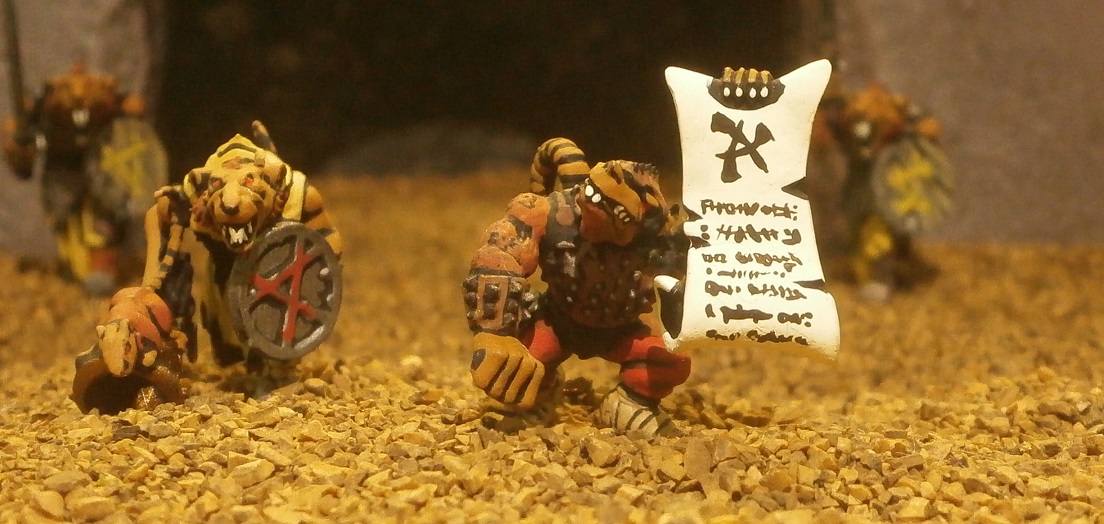
“Entire cities? There are many and more stone walls standing between me and my great-glorious victory. And now that the most hated Dwarf-things are busy-stirring, as ever meddle-interfering, I have their mountains to contend with also. I can surely make good use of death-destruction, but will this weapon defeat the man-things’ stone walls and the dwarf-things’ mountain fastnesses?"
“Noblest of lords, this weapon does not need to smash-break walls or rocks, for it kills everything-all, leaving no-thing alive to hold-defend.”
“Lethal-venom? Deadly-poison?” inquired Lord Urlack, with a hint of barely contained glee in his voice.

“This is quicker, great lord, much quicker. With one, single, exquisite blow, the weapon can blast-burn every living creature-thing within a hundred chebels.”
Lord Urlack pondered this for a moment, and the great cavern grew quiet. “An entire city,” he mused aloud, as he mentally pictured the dimensions of a typical Tilean city. Then his eyes widened. “Or an entire army!”
“As you wish-please, most noble lord,” said the messenger.
“Come, now,” commanded the Grey Seer as he stepped down from his rocky dias. “You and I must speak further concerning what exactly it is your masters desire in exchange for this marvel.”
Winter, IC 2303-4; Somewhere underground in northern Tilea
The Clan Skryre emissary was a particularly unimpressive specimen, more like a menial lackey than the sort of skaven likely to be granted an audience with a Grey Seer. This was, however, no surprise, as the engineers of Clan Skryre were notorious for being so lost in their machines’ arcane technicalities that they gave no thought at all to their appearance, and cared little more about appropriate manners and etiquette.
Seer-Lord Urlak Ashoscrochor knew, however, that Clan Skryre’s assistance was likely to prove vital to his strategy, and so attempted to give no hint of his annoyance at being spoken to directly by what appeared to be little better than a runt-slave.

“Most high and noble Lord,” the messenger began as he fidgeted with the scroll clutched in his left hand, “I come with a great-important opportunity, offered most generous-kind to you first and fore-most before all other possible-likelihoods. My masters know full well that you will understand the potential-worth of this opportunity. They offer you a weapon more destructive than any before dream-conceived of, and yet now built-made and very real.”
The grey seer’s personal guard regiment, several companies of which were stood at the ready around the chamber, glared with apparent evil intent at the messenger.

Of course, this is nothing less than they would have done to anyone who came before them and their master, but that fact did not make the messenger any less nervous.
“Does it please you to listen-hear, noblest of lords?” the lowly engineer-apprentice asked.
"It pleases me well enough that your masters recognise the opportunity given-granted to them by my imminent victory conquests. So, speak-tell further of your masters’ offer!"

The engineer-apprentice unrolled the thick paper of the scroll and held it up fixedly as if showing something marvellous.

“I see-spy only written scrawl,” said Lord Urlak dismissively, as if put the messenger in his place. “Why show me that?”
“These are promises and guarantees!” said the messenger, a little too enthusiastically, for his voice echoed about the rocky cavern and the regimented guards noticeably flinched as if readying to attack. The messenger winced in response.

“Please, I beg-plead, forgive my loud-noisiness, gracious and noble lord,” he continued. “This is written only so that you might confirm-know I speak truthfully. My masters have put mark-symbols here that you will see-recognise and know my words to be truly theirs.”
The grey seer narrowed his eyes to subtly signal his growing impatience. The engineer-apprentice rushed to continue.
“My most clever masters offer you this novel-new weapon in return for sufficient-suitable recompense. With it, you can kill your enemies.”
“My armies bristle with weapons. I have battalion-batteries of war-engines, all capable of killing my enemies.”

“Forgive again, most noble of lords. This kills better. This can kill all your enemies.”
"All?” said Lord Urlack. “It seems your masters have been working most busily. They have already grant-given many terrible war-engines, of which none have yet been unleashed upon my foe-enemies. When and if those machines fulfil their deadly promise then I shall already owe much to your masters …”
Here the Skaven lord fell silent for a moment, and glanced around the vast cavern chamber, as if considering who exactly was listening.

“Of course, all will be carefully weigh-measured to ensure a give-and-take most fair and satisfactory. The spoils of war will be plentiful-bounteous. We shall feast-gorge on the fat of Tilea. It pleases me that your masters appreciate my conquest is a worthy investment. So worthy that here-now they offer me more!”
“As your ally-friends, your patron-providers, they wish you to be victorious,” said the messenger.
The Grey Seer fixed his eyes upon the engineer-apprentice, as if weighing him more carefully.
“Anyone with wit sufficient knows the cunning skill of Clan Skryre,” he said. “And I do not doubt-suspect your masters’ promise-claims. And yet, I must ask-inquire, what do they mean by a weapon never seen before? A weapon you said can kill all my foe-enemies?”
“Great lord, if used well and properly, the weapon will destroy Tilea one city at a time.”

“Entire cities? There are many and more stone walls standing between me and my great-glorious victory. And now that the most hated Dwarf-things are busy-stirring, as ever meddle-interfering, I have their mountains to contend with also. I can surely make good use of death-destruction, but will this weapon defeat the man-things’ stone walls and the dwarf-things’ mountain fastnesses?"
“Noblest of lords, this weapon does not need to smash-break walls or rocks, for it kills everything-all, leaving no-thing alive to hold-defend.”
“Lethal-venom? Deadly-poison?” inquired Lord Urlack, with a hint of barely contained glee in his voice.

“This is quicker, great lord, much quicker. With one, single, exquisite blow, the weapon can blast-burn every living creature-thing within a hundred chebels.”
Lord Urlack pondered this for a moment, and the great cavern grew quiet. “An entire city,” he mused aloud, as he mentally pictured the dimensions of a typical Tilean city. Then his eyes widened. “Or an entire army!”
“As you wish-please, most noble lord,” said the messenger.
“Come, now,” commanded the Grey Seer as he stepped down from his rocky dias. “You and I must speak further concerning what exactly it is your masters desire in exchange for this marvel.”
symphonicpoet
Moderator
^The Manratton Project? Unleashed upon Tilea? This sounds remarkably ominous. Particularly in light of how bad things are getting generally.
Padre
Lord
Genius.symphonicpoet":1ofe9acm said:^The Manratton Project?
symphonicpoet
Moderator
^I am an evil genius I am I am. But it is your story. And your story is marvelous! 
The Fat Git
Vassal
symphonicpoet":3w2bpf4c said:^The Manratton Project? Unleashed upon Tilea? This sounds remarkably ominous. Particularly in light of how bad things are getting generally.
Yes this was very witty. Also as a long time skaven player I am enjoying the ratty twist.
Padre
Lord
Then Fat Git, did you see my new skaven project post? It's at viewtopic.php?p=101488#p101488
The Fat Git
Vassal
I have now and I'm mightily impressed. As a long term skaven player I cannot see anything that could possibly go wrong with such a device! 
Padre
Lord
(I keep forgetting to write this sort of thing: This piece was co-written with Ant, the player playing General Valckenburgh in my campaign. I am going to have to edit some previous posts to mention other players!)
Good Captain
Remas, Palazzo Montini (Official Residence of the Arch-lector of Morr), Winter 2403-4
General Jan Valckenburgh had entered the audience chamber accompanied by only one companion, Captain Wallenstein of his cuirassiers. Several of the arch-lector’s palace guards were stationed about the room’s periphery - at least two of them accompanied him at all times - but the only other person present was his holiness Bernado Ugolini himself. The absence of clerks, priests or advisers was intended to give the impression that the meeting was a private affair.
His holiness was seated upon a heavy and large chair, beside a long table. After greeting the two Marienburgers, he invited Valckenburgh to sit upon the only other chair. He made a fuss over ascertaining whether another chair ought to be brought for the captain, but Wallenstein said he preferred to stand.
It was late afternoon and sunlight poured almost horizontally through the windows to fashion a sedate shadow play from the halberdier guards, an effect engendered by the room’s stark and sparse decoration. Unlike most palazzos with their fantastical frescos and fine friezes, here the walls were plain, white-painted plaster. There were several hanging carpets of intricate designs placed at regular intervals, each woven with the exact same, geometric pattern. As such, they only added to the ambience of calm, meditative reflection.
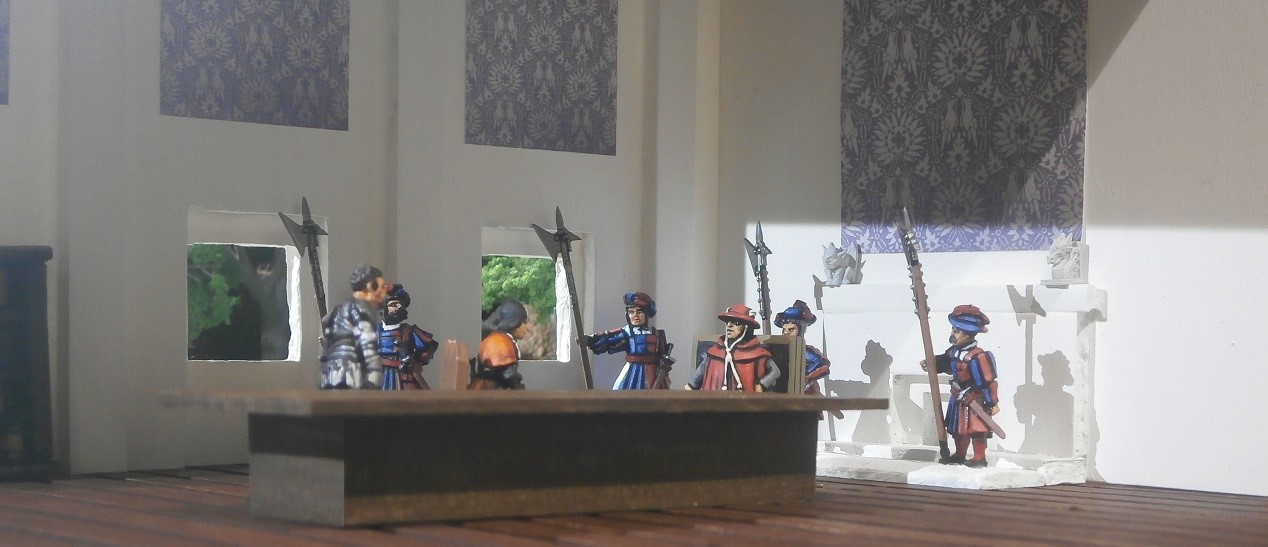
All of this was deliberate. Upon election, the arch-lector had ordered the Palazzo Montini's garish walls and ceilings painted over, and the removal of nearly every statue, golden candelabra, painting and rug. He wanted his palace both to reflect and magnify the thoughtful serenity he yearned to achieve. And he had much thinking to do!
“I am very pleased that at last we meet, good general,” began the arch-lector. “I know full well what you have achieved in the south, your army single-handedly defeating Khurnag’s several forces and so preventing their further cruel incursions. I also know the prejudice of so many Tileans, and the unwarranted suspicions they harbour concerning your presence. Yet here you are now, in answer to both mine and Lord Alessio’s calls, with no obvious reward beyond knowing you will serve with the living against our greatest enemy. And yes, I am aware that even upon your journey northwards you were subject to slanderous slurs and entirely false accusations of plunder and murder. Yet even then you were willing to put aside your righteous anger, forsaking the opportunity to attain entirely justifiable revenge, and continue your march.”
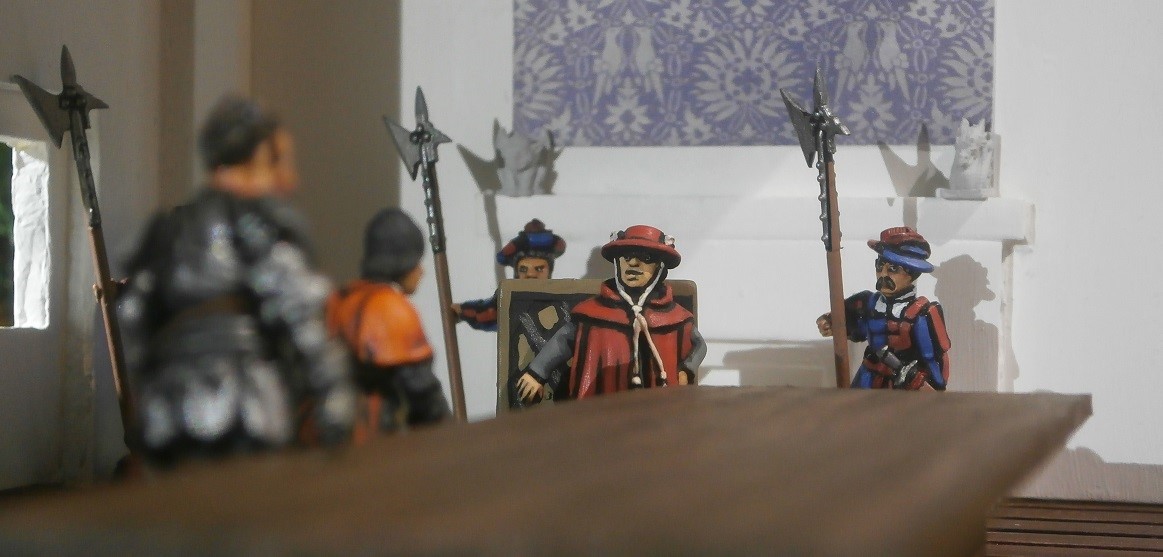
“Indeed, your holiness,” said the general. “Some duties lie above all others, above our personal wants and desires. You, as a man of cloth, know this well. My duties here in Tilea rise above the slanders of petty burghers, and so we move past them.”
Referring to Duke Guidobaldo Gondi, princely ruler of one of the most important city states in Tilea, as a ‘petty burgher’, was an extraordinary slur which the arch-lector must surely have noticed. Yet he gave no hint of displeasure. Perhaps he understood the extreme bitterness the general rightly felt as a consequence of Guidobaldo’s actions, and so recognised the relatively impressive level of self-control required to limit the inevitable anger to such words alone?
“Although it may seem inappropriate for me to do so,” said Bernado, “for I am not the party who wronged you, nevertheless I wish to offer Tilea’s apology, being that of my own beloved flock, the followers of the three gods and the vast majority of the citizens and subjects of the realm. Duke Guidobaldo is but one man, howsoever many flaws he possesses, and I would not have you think badly of the entire realm because of his unforgiveable actions.”
The general nodded, graciously. “Thus I have discovered, your holiness. Many who dwell in this bountiful land have proved themselves most worthy and I sincerely hope to aid the nobles and the mother church restore peace and prosperity.”

“Your help is much appreciated, good general,” said the arch-lector. “I fully accept that there must be consequences for Duke Guidobaldo’s actions. Yet I see now that you can look beyond his crimes to the greater danger; that you recognise the need to deal with other, much more terrible threats than Guidobaldo’s dishonourable conduct. His actions will not be forgotten, nor forgiven - I do assure you. You have my word, General Valckenburgh, that when this war is won, I will consult with you concerning what procedures should be initiated and what recompense ought to be demanded of the duke.”
The general nodded, but it was the captain behind him who spoke.
“The army's officers will be glad to hear that promise, your holiness. Knowing that past wrongs are to be righted will help them to concentrate upon that which must concern them now.”
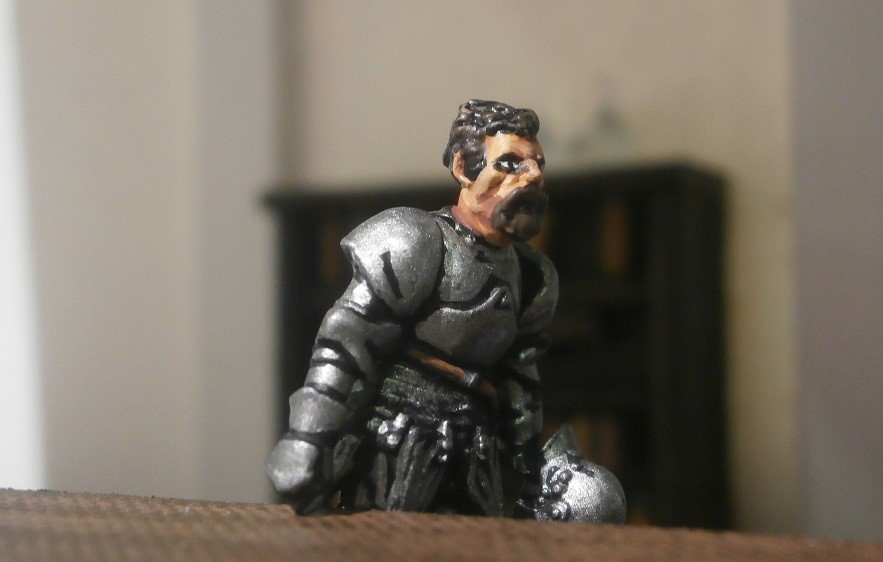
“I should expect this promise will help all your soldiers in the battles to come,” offered the arch-lector. “I would not want them suspicious of their Tilean allies, especially when the lives of both hang in the balance.”
General Valckenburgh smiled. “You can put that worry from your mind, your holiness. We have many a Tilean in our army, from the lowliest sapper to the Lady Luccia la Fanciulla, the bearer of our Myrmidian standard, so we know Tileans can be honourable and brave. As for Duke Guidobaldo, I am satisfied with your suggestions. He can be suitably censured by the church when the great troubles are resolved, and until then it is a waste of all our efforts to pursue the matter. I would, however, hope your churchmen will use their influence to remind the more insular of their Pavonan flock that we are all allies against the terrible enemy.”
The arch-lector gave a wry smile. “I will instruct exactly that, but I would not get your hopes up concerning the sermonising of my Pavonan priests. They have certain schismatic tendencies, encouraged by the duke himself.”

“So, we’re not the only ones to be troubled by the duke’s games?” asked the captain.
“No, captain,” said the arch-lector. “Few who have had any dealings with Guidobaldo come away entirely unscathed. Yet … I know this can be no consolation to you, nor do I suggest it should, but I would at least have you know that his son, Lord Silvano, is cut from a very different cloth than that of his father. I believe him to be honourable to a fault. Indeed, such is his proper obedience, his lack of selfishness and guile, that I doubt he can even see his own father’s faults. Lord Silvano has faced many enemies, remaining steadfastly true to his word, and even when defeated and pursued from the field, he yet returns willingly to fight again. Even his own men hid their treachery from him when the ogres were attacked at Viadaza – presumably they knew he would order them to desist if he learned their intentions. I have supped and marched with him, witnessed his bravery in battle, and I believe I know him well. Let not the sins of the father be visited upon the son.”
The general sighed. “Lord Silvano has without doubt demonstrated his bravery,” he said, “and his loyalty to his family is without question. Yet, your holiness, I advise caution, for he could be more dangerous than his father. Cunning and bravery combined make for a great prince - one all others should be most wary of.”
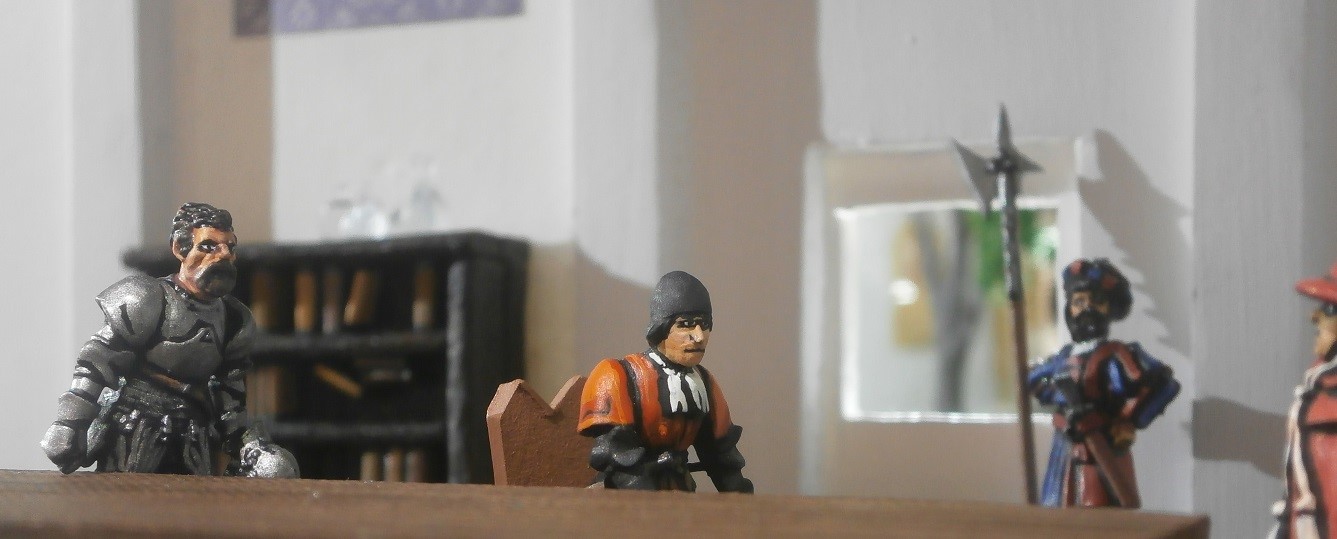
“Cunning?” asked the arch-lector.
“What we see is what Lord Silvano wants us to see. How better to avoid all censure for a mutiny than to appear not only ignorant of it but also to have very convenient proof of one’s own absence while it occurred? And think how well it serves his father that he can gain grateful friends for the princely heir of Pavona even while his father continues heinous crimes?”
“You think his very character is mere pretence?” asked the arch-lector, a note of incredulity evident in his tone.
“I cannot know for certain, your holiness. But it has proven very convenient for his father. I spoke at length to Lord Silvano and found him far too eloquent to be considered a naive youth, and too keen to present his father’s numerous misdeeds in a good light to be entirely honest. His excuses and justifications were neatly crafted, like a lawyer’s speech before a judge. He appeared to be more of a skilful, even duplicitous diplomat than, as you suggest, a guileless youth.”
The arch-lector nodded slowly. “I shall keep your words in mind, good general, upon future occasions,” he said. Changing tack, he asked, “What do you know of the tyrant Boulderguts’ whereabouts?”
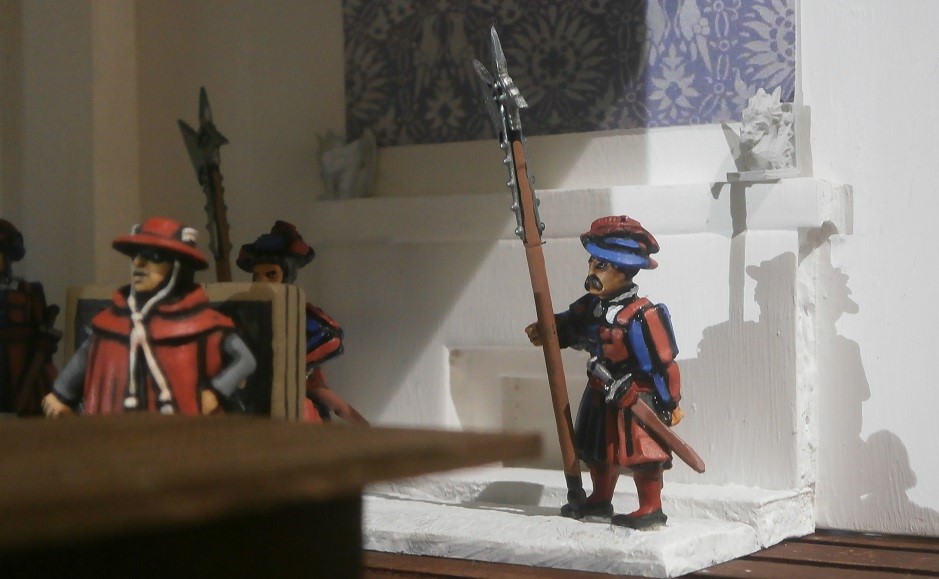
“Little that is certain, which troubles me. I have learned what is commonly said to be the case but have no way of knowing if it is true. It was this consideration that led me to follow my elected route of march, being farther east than I might otherwise have traveled, in the hope that I could intercept the ogres if they attempted to skirt Lord Alessio’s army. And although my army’s scouts are adequate to the task of supporting a marching column, I lack the numbers required to scour the entire eastern reaches of Tilea.”
The arch-lector nodded. “For brutes they have proved to be a surprisingly nimble foe, and slippery to boot. However, my advisers are unanimously of the opinion that Boulderguts has departed Tilea, making his way across the mountain passes to the Border Princes, whence he came. Reports from the vicinity of the Via Nano confirm this. Still, this does not mean he no longer presents a threat. We must not be careless, for he could return to seek plunder where he found so much before – a prospect that can only grow more likely as time passes and his haul of loot diminishes. At present, however, we must contend with new robbers. No doubt you have heard how the Sartosans have brutally raped Luccini? It is almost certain they have their eyes set upon more prizes, especially as every city state is either sapped of strength by the ongoing wars or unprotected because their armies have marched north. I heard that their commander, Volker, is a Marienburger? Is this true?”
“Of course, I’ve heard of Volker,” answered the general. “And it does seem likely he hails from Marienburg. The VMC is a merchant company. As such, we make a point of learning what we can of all pirates, especially if they might prove detrimental to our enterprises. But I have never dealt personally with this particular one. As is so often the case, he was probably a mere sea artist or mate, rather than a captain or merchant, who mutinously turned to piracy. Not the sort of fellow I would know.”
“By your leave, general?” asked the captain.
“Speak your mind,” said Valckenburgh.
The captain turned to the arch-lector. “I do no doubt, your holiness, the Sartosans could be more than a mere thorn in our side, and that while Boulderguts lives he too remains a threat, but surely the vampire duchess presents the most immediate and greatest danger? No-one would happily turn their back on the Sartosans, but do we have a choice?”
“I do not believe we do,” said the arch-lector. “The pirates should be scattered for years to come by just one powerful blow, and in time that will be done I am sure. Much more than that is needed to rid Tilea of the undead. Despite defeating them several times, their evil only grows. For them, all our victories have proved to be nothing more than minor setbacks. They never want for soldiers and they know no fear, for they are blasphemy made flesh by foul conjurations.”
There was a moment’s silence as the arch-lector became lost in thought, a frown fixed upon his face, his eyes glazing as if he no longer saw the others in the room.
“Your holiness,” said the general. “My army can help to contain them, in the field or in their fastnesses, but only the church or colleges have the power to provide any lasting answer. Weight of numbers is sufficient merely to check their further advances, and that only for a time. We have need of holy intervention or arcane magics if we are truly to destroy them. Either that or the aid of great heroes of legend.”
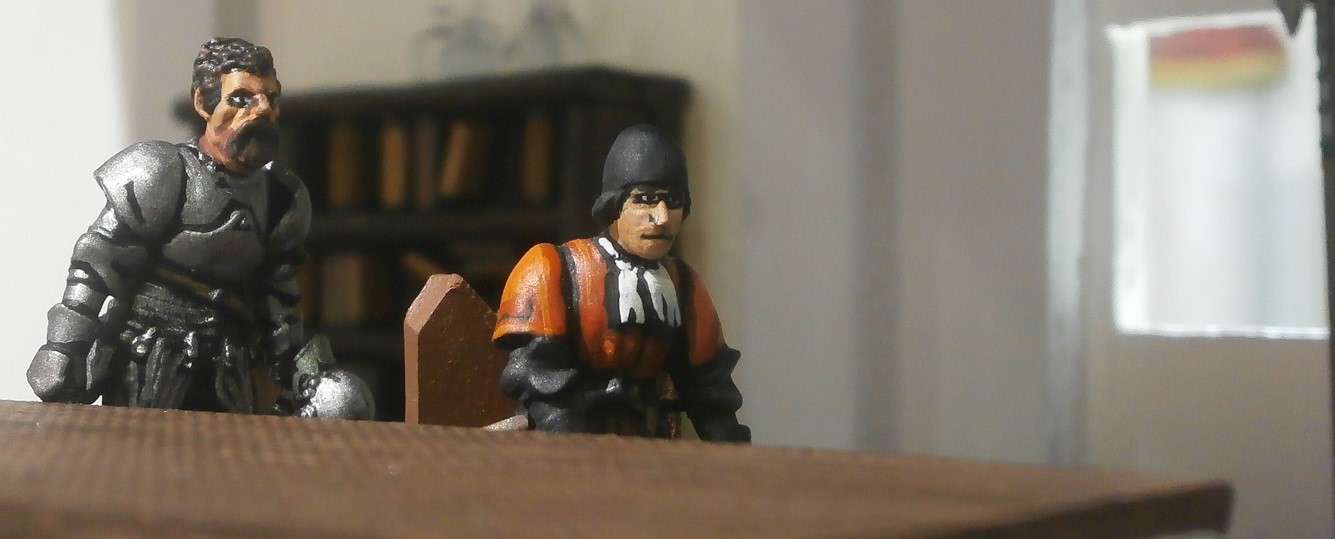
“The latter I am afraid we lack, despite a crowd of great villains. Even an army of cultists, painfully dedicated in body and soul to Morr, failed against them. I not only pray for guidance daily, but have consulted the wisest maestros and wizards Remas has to offer. Only yesterday I met with Angelo da Leoni, who spoke concerning the manifestation and magnification of purifying flames to burn the vampires’ armies, their leaders amongst them, unto their very core, obliterating even the wicked spirits possessing their bodily frames, yet finally admitting his want of the necessary ingredients for such, and great doubt concerning whether such could ever be successfully and safely brought to bear.”
“An answer is needed, your holiness. Otherwise all our sacrifices might prove to be in vain. And this is not all we must contend with. Lord Alessio has sent word to me twice of Skaven sightings - armies, he said, although apparently small.”
The arch-lector nodded gravely. “It is true,” he said. “I have received the same intelligence from Captain Soldatovya, commanding the Remans who march with the Portomaggiorans. He himself saw one of the tunnel mouths and his own scouts saw one of the armies. Small, as you say. Perhaps nothing more than a raiding party? Or the ragged remnant of some faction fleeing a far-off civil war?”
“You have reason to think so?” asked the general.
“No, good general, I only have hope that it is so. If they are the vanguard for something bigger then their arrival could be the last straw for Tilea.”
“They are vile threat,” spat Valckenburgh, his particular hate for them being obvious. “Much worse than orcs, perhaps more so than the ogres and undead. They’re an insidious and infectious foe who must be purged in all instances.”
Perhaps the arch-lector was reminded of a certain predecessor’s infamous pact with the ratto uomo? If so, he hid it well, simply saying, “I have tasked several scholars with looking into how we beat them in ages past.”
The captain almost laughed.
“I wonder,” he asked, “Back then, were the Tileans fighting ogres, vampires and Sartosans as well as the ratmen?”
Good Captain
Remas, Palazzo Montini (Official Residence of the Arch-lector of Morr), Winter 2403-4
General Jan Valckenburgh had entered the audience chamber accompanied by only one companion, Captain Wallenstein of his cuirassiers. Several of the arch-lector’s palace guards were stationed about the room’s periphery - at least two of them accompanied him at all times - but the only other person present was his holiness Bernado Ugolini himself. The absence of clerks, priests or advisers was intended to give the impression that the meeting was a private affair.
His holiness was seated upon a heavy and large chair, beside a long table. After greeting the two Marienburgers, he invited Valckenburgh to sit upon the only other chair. He made a fuss over ascertaining whether another chair ought to be brought for the captain, but Wallenstein said he preferred to stand.
It was late afternoon and sunlight poured almost horizontally through the windows to fashion a sedate shadow play from the halberdier guards, an effect engendered by the room’s stark and sparse decoration. Unlike most palazzos with their fantastical frescos and fine friezes, here the walls were plain, white-painted plaster. There were several hanging carpets of intricate designs placed at regular intervals, each woven with the exact same, geometric pattern. As such, they only added to the ambience of calm, meditative reflection.

All of this was deliberate. Upon election, the arch-lector had ordered the Palazzo Montini's garish walls and ceilings painted over, and the removal of nearly every statue, golden candelabra, painting and rug. He wanted his palace both to reflect and magnify the thoughtful serenity he yearned to achieve. And he had much thinking to do!
“I am very pleased that at last we meet, good general,” began the arch-lector. “I know full well what you have achieved in the south, your army single-handedly defeating Khurnag’s several forces and so preventing their further cruel incursions. I also know the prejudice of so many Tileans, and the unwarranted suspicions they harbour concerning your presence. Yet here you are now, in answer to both mine and Lord Alessio’s calls, with no obvious reward beyond knowing you will serve with the living against our greatest enemy. And yes, I am aware that even upon your journey northwards you were subject to slanderous slurs and entirely false accusations of plunder and murder. Yet even then you were willing to put aside your righteous anger, forsaking the opportunity to attain entirely justifiable revenge, and continue your march.”

“Indeed, your holiness,” said the general. “Some duties lie above all others, above our personal wants and desires. You, as a man of cloth, know this well. My duties here in Tilea rise above the slanders of petty burghers, and so we move past them.”
Referring to Duke Guidobaldo Gondi, princely ruler of one of the most important city states in Tilea, as a ‘petty burgher’, was an extraordinary slur which the arch-lector must surely have noticed. Yet he gave no hint of displeasure. Perhaps he understood the extreme bitterness the general rightly felt as a consequence of Guidobaldo’s actions, and so recognised the relatively impressive level of self-control required to limit the inevitable anger to such words alone?
“Although it may seem inappropriate for me to do so,” said Bernado, “for I am not the party who wronged you, nevertheless I wish to offer Tilea’s apology, being that of my own beloved flock, the followers of the three gods and the vast majority of the citizens and subjects of the realm. Duke Guidobaldo is but one man, howsoever many flaws he possesses, and I would not have you think badly of the entire realm because of his unforgiveable actions.”
The general nodded, graciously. “Thus I have discovered, your holiness. Many who dwell in this bountiful land have proved themselves most worthy and I sincerely hope to aid the nobles and the mother church restore peace and prosperity.”

“Your help is much appreciated, good general,” said the arch-lector. “I fully accept that there must be consequences for Duke Guidobaldo’s actions. Yet I see now that you can look beyond his crimes to the greater danger; that you recognise the need to deal with other, much more terrible threats than Guidobaldo’s dishonourable conduct. His actions will not be forgotten, nor forgiven - I do assure you. You have my word, General Valckenburgh, that when this war is won, I will consult with you concerning what procedures should be initiated and what recompense ought to be demanded of the duke.”
The general nodded, but it was the captain behind him who spoke.
“The army's officers will be glad to hear that promise, your holiness. Knowing that past wrongs are to be righted will help them to concentrate upon that which must concern them now.”

“I should expect this promise will help all your soldiers in the battles to come,” offered the arch-lector. “I would not want them suspicious of their Tilean allies, especially when the lives of both hang in the balance.”
General Valckenburgh smiled. “You can put that worry from your mind, your holiness. We have many a Tilean in our army, from the lowliest sapper to the Lady Luccia la Fanciulla, the bearer of our Myrmidian standard, so we know Tileans can be honourable and brave. As for Duke Guidobaldo, I am satisfied with your suggestions. He can be suitably censured by the church when the great troubles are resolved, and until then it is a waste of all our efforts to pursue the matter. I would, however, hope your churchmen will use their influence to remind the more insular of their Pavonan flock that we are all allies against the terrible enemy.”
The arch-lector gave a wry smile. “I will instruct exactly that, but I would not get your hopes up concerning the sermonising of my Pavonan priests. They have certain schismatic tendencies, encouraged by the duke himself.”

“So, we’re not the only ones to be troubled by the duke’s games?” asked the captain.
“No, captain,” said the arch-lector. “Few who have had any dealings with Guidobaldo come away entirely unscathed. Yet … I know this can be no consolation to you, nor do I suggest it should, but I would at least have you know that his son, Lord Silvano, is cut from a very different cloth than that of his father. I believe him to be honourable to a fault. Indeed, such is his proper obedience, his lack of selfishness and guile, that I doubt he can even see his own father’s faults. Lord Silvano has faced many enemies, remaining steadfastly true to his word, and even when defeated and pursued from the field, he yet returns willingly to fight again. Even his own men hid their treachery from him when the ogres were attacked at Viadaza – presumably they knew he would order them to desist if he learned their intentions. I have supped and marched with him, witnessed his bravery in battle, and I believe I know him well. Let not the sins of the father be visited upon the son.”
The general sighed. “Lord Silvano has without doubt demonstrated his bravery,” he said, “and his loyalty to his family is without question. Yet, your holiness, I advise caution, for he could be more dangerous than his father. Cunning and bravery combined make for a great prince - one all others should be most wary of.”

“Cunning?” asked the arch-lector.
“What we see is what Lord Silvano wants us to see. How better to avoid all censure for a mutiny than to appear not only ignorant of it but also to have very convenient proof of one’s own absence while it occurred? And think how well it serves his father that he can gain grateful friends for the princely heir of Pavona even while his father continues heinous crimes?”
“You think his very character is mere pretence?” asked the arch-lector, a note of incredulity evident in his tone.
“I cannot know for certain, your holiness. But it has proven very convenient for his father. I spoke at length to Lord Silvano and found him far too eloquent to be considered a naive youth, and too keen to present his father’s numerous misdeeds in a good light to be entirely honest. His excuses and justifications were neatly crafted, like a lawyer’s speech before a judge. He appeared to be more of a skilful, even duplicitous diplomat than, as you suggest, a guileless youth.”
The arch-lector nodded slowly. “I shall keep your words in mind, good general, upon future occasions,” he said. Changing tack, he asked, “What do you know of the tyrant Boulderguts’ whereabouts?”

“Little that is certain, which troubles me. I have learned what is commonly said to be the case but have no way of knowing if it is true. It was this consideration that led me to follow my elected route of march, being farther east than I might otherwise have traveled, in the hope that I could intercept the ogres if they attempted to skirt Lord Alessio’s army. And although my army’s scouts are adequate to the task of supporting a marching column, I lack the numbers required to scour the entire eastern reaches of Tilea.”
The arch-lector nodded. “For brutes they have proved to be a surprisingly nimble foe, and slippery to boot. However, my advisers are unanimously of the opinion that Boulderguts has departed Tilea, making his way across the mountain passes to the Border Princes, whence he came. Reports from the vicinity of the Via Nano confirm this. Still, this does not mean he no longer presents a threat. We must not be careless, for he could return to seek plunder where he found so much before – a prospect that can only grow more likely as time passes and his haul of loot diminishes. At present, however, we must contend with new robbers. No doubt you have heard how the Sartosans have brutally raped Luccini? It is almost certain they have their eyes set upon more prizes, especially as every city state is either sapped of strength by the ongoing wars or unprotected because their armies have marched north. I heard that their commander, Volker, is a Marienburger? Is this true?”
“Of course, I’ve heard of Volker,” answered the general. “And it does seem likely he hails from Marienburg. The VMC is a merchant company. As such, we make a point of learning what we can of all pirates, especially if they might prove detrimental to our enterprises. But I have never dealt personally with this particular one. As is so often the case, he was probably a mere sea artist or mate, rather than a captain or merchant, who mutinously turned to piracy. Not the sort of fellow I would know.”
“By your leave, general?” asked the captain.
“Speak your mind,” said Valckenburgh.
The captain turned to the arch-lector. “I do no doubt, your holiness, the Sartosans could be more than a mere thorn in our side, and that while Boulderguts lives he too remains a threat, but surely the vampire duchess presents the most immediate and greatest danger? No-one would happily turn their back on the Sartosans, but do we have a choice?”
“I do not believe we do,” said the arch-lector. “The pirates should be scattered for years to come by just one powerful blow, and in time that will be done I am sure. Much more than that is needed to rid Tilea of the undead. Despite defeating them several times, their evil only grows. For them, all our victories have proved to be nothing more than minor setbacks. They never want for soldiers and they know no fear, for they are blasphemy made flesh by foul conjurations.”
There was a moment’s silence as the arch-lector became lost in thought, a frown fixed upon his face, his eyes glazing as if he no longer saw the others in the room.
“Your holiness,” said the general. “My army can help to contain them, in the field or in their fastnesses, but only the church or colleges have the power to provide any lasting answer. Weight of numbers is sufficient merely to check their further advances, and that only for a time. We have need of holy intervention or arcane magics if we are truly to destroy them. Either that or the aid of great heroes of legend.”

“The latter I am afraid we lack, despite a crowd of great villains. Even an army of cultists, painfully dedicated in body and soul to Morr, failed against them. I not only pray for guidance daily, but have consulted the wisest maestros and wizards Remas has to offer. Only yesterday I met with Angelo da Leoni, who spoke concerning the manifestation and magnification of purifying flames to burn the vampires’ armies, their leaders amongst them, unto their very core, obliterating even the wicked spirits possessing their bodily frames, yet finally admitting his want of the necessary ingredients for such, and great doubt concerning whether such could ever be successfully and safely brought to bear.”
“An answer is needed, your holiness. Otherwise all our sacrifices might prove to be in vain. And this is not all we must contend with. Lord Alessio has sent word to me twice of Skaven sightings - armies, he said, although apparently small.”
The arch-lector nodded gravely. “It is true,” he said. “I have received the same intelligence from Captain Soldatovya, commanding the Remans who march with the Portomaggiorans. He himself saw one of the tunnel mouths and his own scouts saw one of the armies. Small, as you say. Perhaps nothing more than a raiding party? Or the ragged remnant of some faction fleeing a far-off civil war?”
“You have reason to think so?” asked the general.
“No, good general, I only have hope that it is so. If they are the vanguard for something bigger then their arrival could be the last straw for Tilea.”
“They are vile threat,” spat Valckenburgh, his particular hate for them being obvious. “Much worse than orcs, perhaps more so than the ogres and undead. They’re an insidious and infectious foe who must be purged in all instances.”
Perhaps the arch-lector was reminded of a certain predecessor’s infamous pact with the ratto uomo? If so, he hid it well, simply saying, “I have tasked several scholars with looking into how we beat them in ages past.”
The captain almost laughed.
“I wonder,” he asked, “Back then, were the Tileans fighting ogres, vampires and Sartosans as well as the ratmen?”
symphonicpoet
Moderator
Padre,
Your story grows more compelling with each new addition. I can't wait to see the next chapter. This is a thing of complex and delicate beauty.
Your story grows more compelling with each new addition. I can't wait to see the next chapter. This is a thing of complex and delicate beauty.
Lands Annex
Vassal
Absolutely fantabulous continuations Padre.
I've been off forum for a while and what a delight to come back and have all this lovely stuff to catch up on.
Love your Doomwheel/Artillery piece in the link too, looking forward to seeing how that fares!
I've been off forum for a while and what a delight to come back and have all this lovely stuff to catch up on.
Love your Doomwheel/Artillery piece in the link too, looking forward to seeing how that fares!
Padre
Lord
Thanks Lands Annex. You can learn a little bit more about it now if you like!
...
Keep Going!
Somewhere in the mountains of north Tilea, Winter 2403-4
Fricknar had never in all his cruelty-filled life undertaken a journey as difficult as this. They were in such a hurry that they were not allowed to stop for more than a few moments at a time. So far, six nights and five days of almost perpetual motion, a relentless succession of step, step, step; eating, even excreting, on the move. Every now and again he would have to run ahead to shovel something quickly - filling a hole or flattening a lump. Invariably, just as he completed the labour, the trundling engine caught up he was required to move on again.
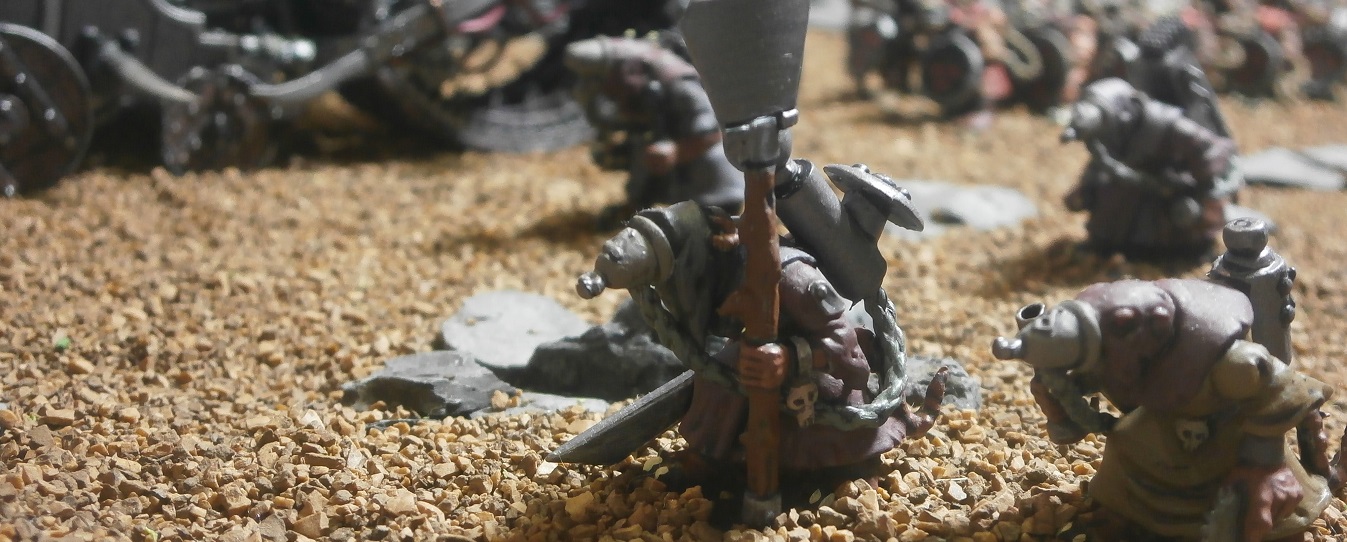
In his bones he knew that should he continue at this pace another day then it would also become the most painful time of his life, not just the hardest journey. He had been badly beaten three times as a pup, and on the last occasion, as he lay battered and dazed, another pup from his own litter had eaten one of his fingers! He had been wracked with a burning pain in his lungs for countless days when he took a mouthful of warpstone vapour after an manufactory accident. He had been imprisoned in a near airless cage for more than a week as punishment for an infraction he never understood, starved of food and nauseously dizzied by the swinging motion of the cage every time someone pushed it (which many did and often). Right now, his pain and anguish were building up to rival all those past experiences, and by tomorrow, would surely overtake them.
His last task had been to assess the quality of a warpstone batch being offered by a small clan who had acquired it by (the usual) nefarious means. It had been flawed, but still useful, and a price was offered. Before he learned whether the purchase was successful, however, he been ordered to return with all haste to the workshops. Immediately upon doing so, he was assigned this new task - no time for explanations, no rest nor repast, but straight to work.
By the end of the first day he realised he knew none of the engine’s other attendants. Since then there had been little chance to get to know them, what with the incessant motion. Escorting the engine was an all-encompassing task, leaving little time anything else. The tunnels they had travelled through, despite being large, had been irregularly proportioned, in both width and height, and the ground uneven, scattered with tumbled rocks from crumbling walls. Here and there, roots had penetrated the ceiling, and stalagmites and stalactites had been allowed to form along the dampest stretches. Sometimes there was a way around such obstacles, but often they had to be cleared – lifted, hacked or chipped away – and his shovel was a necessary part of nearly all these tasks.
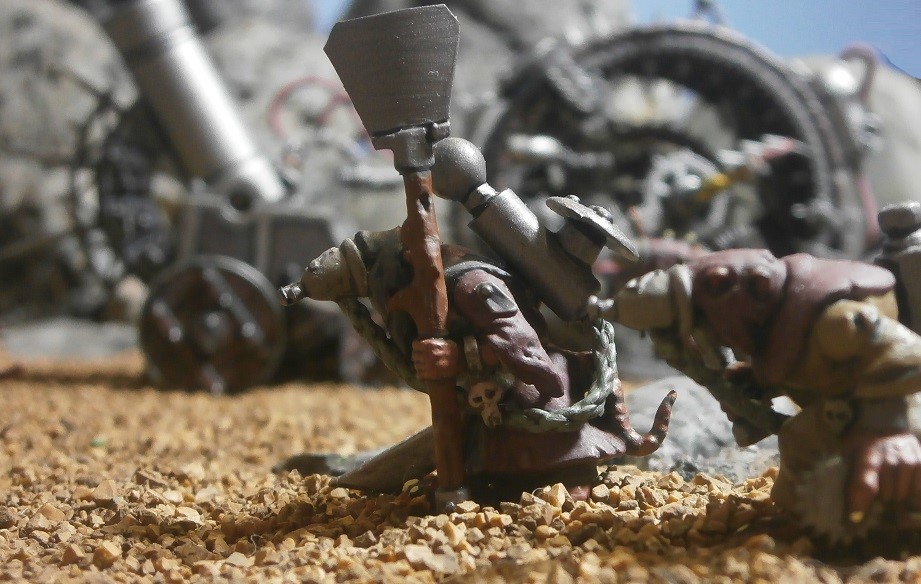
Their orders were clear, and in no uncertain terms: the engine must not collide or scrape against anything, nor should it jolt more than a little, and it should certainly never be allowed to list or careen. Most importantly, it must never stop.
It was possibly the most demanding assignment ever given to anyone, anywhere, at any time.
For a little while he had occupied his mind with attempting to work out whether the attendant who invariably walked in front of the engine, clutching a staff tipped with what appeared to be a fine shard of warpstone …

… or the engine’s driver were responsible for setting the pace, whilst also taking on board the possibility the engine itself might be most to blame. Before he had come to a decision, however, distraction and exhaustion had shattered such trivial considerations.
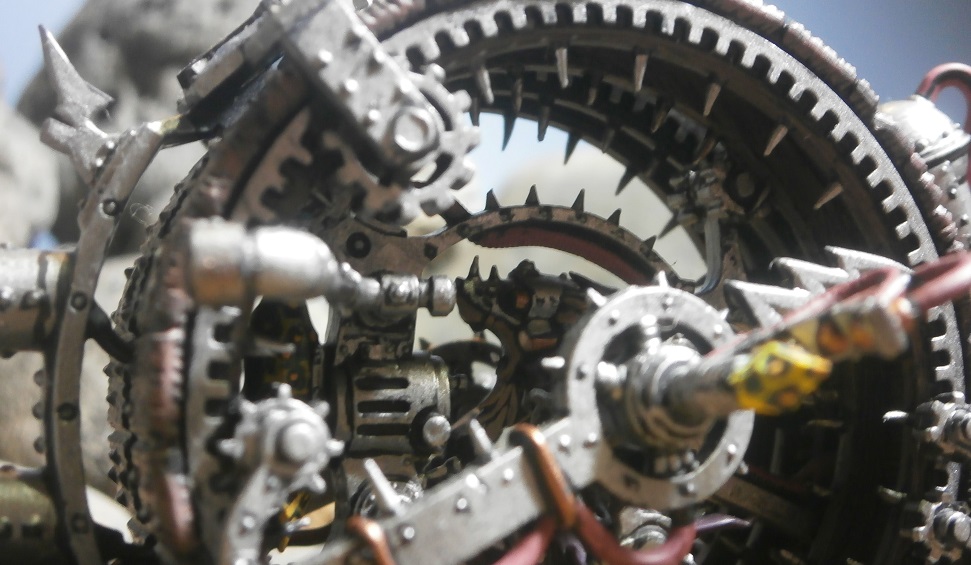
Now, here in a mountain valley between two tunnel-stretches, on the widest path yet traversed, with no walls or ceiling to concern him, only the ground itself, Fricknar was able to loosen and lift his mask just a little to allow in a breath or two of fresh air, and at long last, he had the chance to talk.
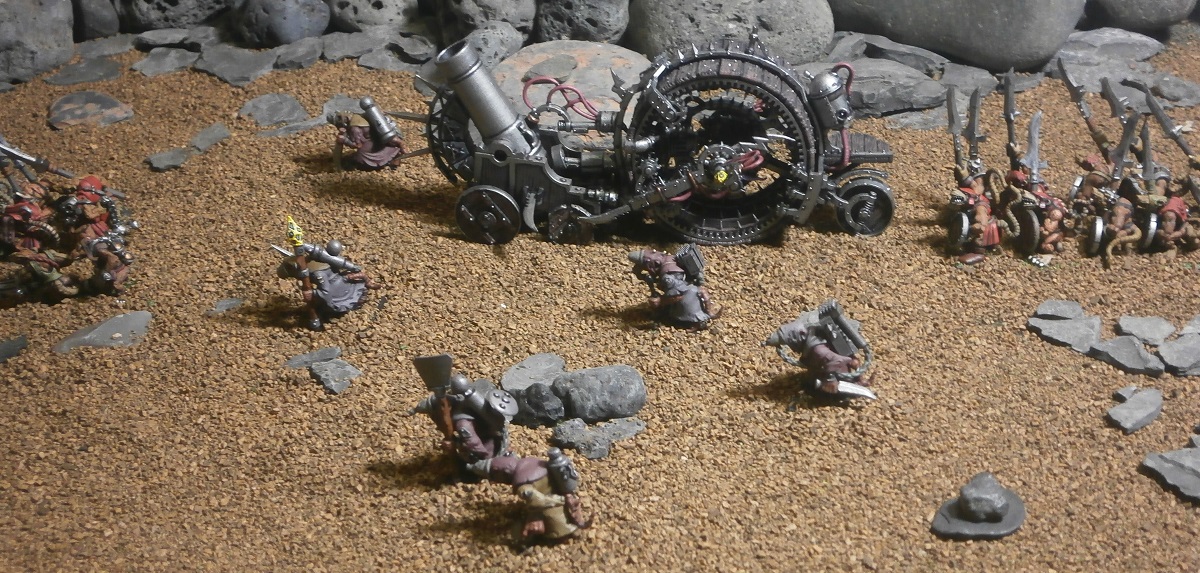
He had questions to ask.
Turning to the attendant closest to him, a red-hooded fellow carrying a tubular locking tool which could loosen any of several bolts on the engine and in the other hand what appeared to be a small gear wheel (presumably ready to replace some potentially defective part) he said,
“I heard we have gift-given much and more to the lord of Foul Peak. Why give this also? Why more and more?”

“Not gifts, no,” said his companion in a whining voice muffled by his mask. “All and everything will be paid for.”
“That matters not,” said Fricknar.
“It matters a lot,” countered the other.
“Yes, yes, to our masters, to the clan. I know-understand,” said Fricknar. “I mean it matters not to what I ask-enquire. Why give him more? Why this most novel, expensive engine? I heard his army has yet to fight one-single battle. His warriors have neither proved themselves capable nor wanting. Yet we fetch-bring such a reinforcement. Why?”
“You do not know-understand what this can do. You did not slave-work on its construction.”
“No, not I,” Fricknar admitted. “I know the quality-worth of warpstone, and I can keep an engine on the move.” He waved his shovel as if to prove the point.
“You have never moved such a one as this.”
Despite having studied the engine on several occasions over the last days, for want of much else to look at during the few moments he had not needed to watch the road, Fricknar looked again.

“I see only a doomwheel, like many others, with a murdering piece fix-attached,” he said.
“Yes, yes, you see that,” scoffed the other. “But what murder this can do. This kills many and much more than anything we have yet made. This might perhaps kill more than any single weapon has ever-ever killed!”
Fricknar looked at the engine again.
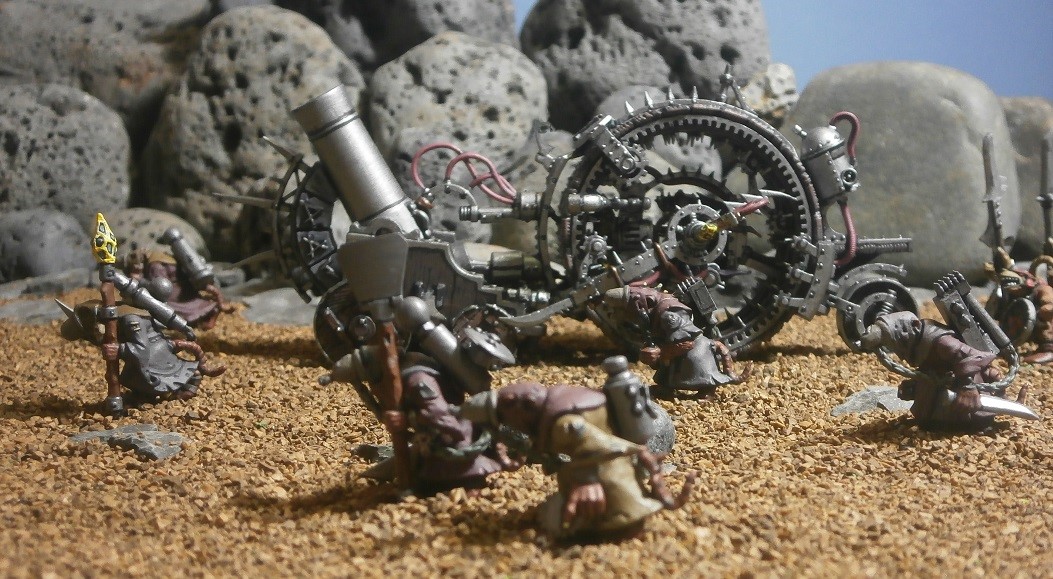
“It throws a bomb, yes?” he asked.
“Oh yes,” said the other. “A bomb. One bomb.”
“A poisoned-wind grenado?”
“It throws poison-death, yes, but not wind-vapours. The bomb inside is a thick shell of perfect-pure warpstone, two half-pieces fastened tight-together, and inside that inside is the finest ground-powdered warpstone, the making of which killed many hundred slaves, admixed with black powder in exact and most potent proportion-measure; precise and finely fused to explode the merest moment before touching the ground, which it must-must do, to release flesh-burning death to wash for a hundred and more chebels in each and every direction.”
“Warp-fire?”
“Yes, at first, but then much farther, a pure and poisonous etheric heat, burn-scalding all and only living flesh to a blistered crisp.”
Fricknar fell silent for a while. He had to think this through, for what he had heard did not sit well with his past experiences. Not well at all.
“Precise and finely fused, you spoke-said?” he asked.
“Yes, yes,” said the other. “Most and definitely very necessary.”
“And if, despite your careful care, it explodes too too soon?”
“Think, fool!” said the other, with a snarling hiss Fricknar could sense despite the mask and hood hiding his companion’s face.
He did not need to think. “Too too soon,” said Fricknar, “and we die too.”
“Yes!” said the other, loudly. “If even only a little too soon, then it will not be where we need-want it to be. It must be at the heart of the city. A moment too late and too much heat will pierce the ground - wasteful, for you cannot kill what is already dead.”
“This kills a city?”
“A city. An army,” said the other, a note of arrogant, easy pride in his voice. “Perhaps more?”
Fricknar’s fearful apprehension was now transforming into admiration. Then something occurred to him.
“Where are the bombs?” he asked.
“Are you deaf? Do you not listen-hear?” mocked the other. “You mean where is the bomb?”
Fricknar did not understand. Was that not what he had asked? There was just the engine, no carriage, wagon or slaves to bear a limber of any kind. He had absently assumed that the ammunition must already be at their destination, but hearing his companion’s description suggested such a cargo would be too rare and precious to be merely stockpiled elsewhere.
“The bomb,” said the other, emphasising the singularity, “is inside. It broil-brews, always and now, growing more and more potent by the hour. To haul-carry it separately would mean by the time we tried to load it into the engine all who came near-close would die immediate-quickly.”
This made no sense to Fricknar. “But we are nearby, and for days?”
“Yes, yes. The iron barrel enclosing it is thick-strong and inscribed inside with most potent-effectual sigillic wards, perfectly carved.”
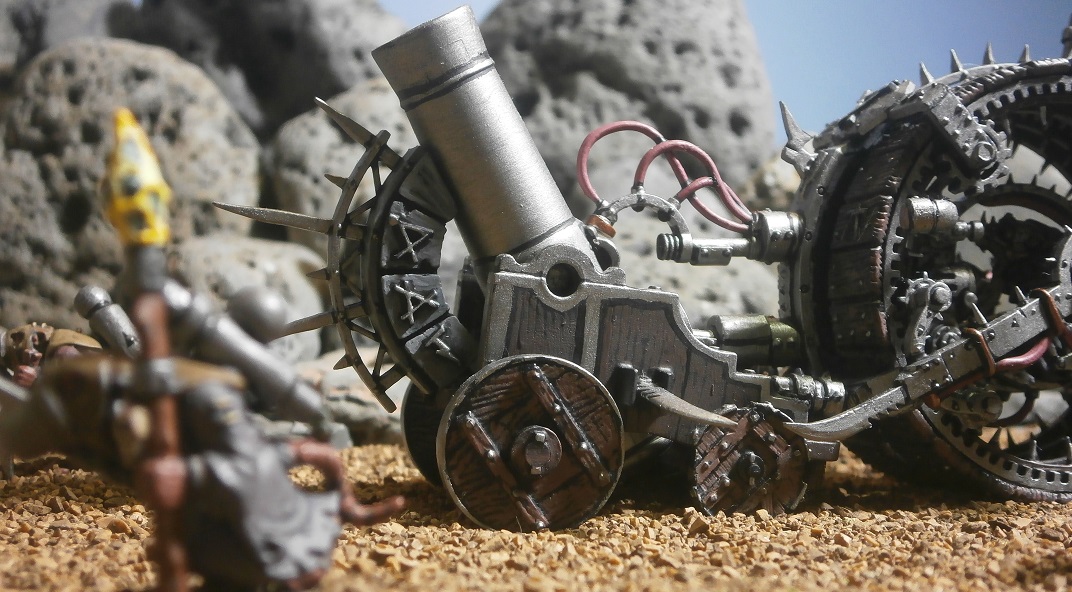
Fricknar could imagine the carver squirming inside the barrel to carve such sigils - a suffocating, claustrophobic trial undoubtably far worse than his time in the cage.
“Could not a container-chest be made with such thickness or more?” he asked. “Such sigils? And better sealed tight-secure?”
“Yes, yes it could. No doubt. More easily made. More safely carried. But think, to load the murdering piece we would have to remove the bomb from the chest after it had broil-brewed for the whole journey. Impossibly intolerable.”
“Could slaves not be ordered to do so? Or some monstrous creation of Clan Moulder?”
“No, no, never. They would die the very instant the chest was breached.”
Fricknar glanced back at the engine.
“And dead slaves and ogres cannot load anything,” he said almost to himself. Then, louder, he asked, “So the sigil-wards prevent all harm leak-spilling out?”
“Not all, no,” said the other, as if it were obvious.
Of course, Fricknar should have known this. He pulled his loosened mask tight again, immediately regretting every breath of ‘fresh’ air he had taken. No skaven workshop ever made anything completely safe. The ever-present fear of punishment meant there was always haste as corners were cut, mistakes were inevitably concealed, and tests were deemed a pointless exercise when something was already completed. If it is built, use it! Worse still, most engines were made before the principles were even fully understood, so that the very design had flaws before even the first component part was assembled. None of those who invented or fashioned such engines cared a jot for the fate of those who would be ordered to use them; besides, once one engine was taken, they were immediately busy with the next, then the next.
“It is impossible to prevent it all, for it is far too potent, and grows ever more so,” the other continued. “Why do you think the engine never stops? It cannot be allowed to. If it did then too, too much of its etheric heat would concentrate-congeal in one single place. Then there would be none left to move it.”
Fricknar was confused again. “We have our masks, our waxed robes, our cylinder-filters, yes. But look here, these clanrats, they have guard-escorted us so, so far, even through the long tunnels. Why are they not dead or dying?”
There were two bands of guards, one marching before the engine, which included a weapons team armed with a rattling gun …
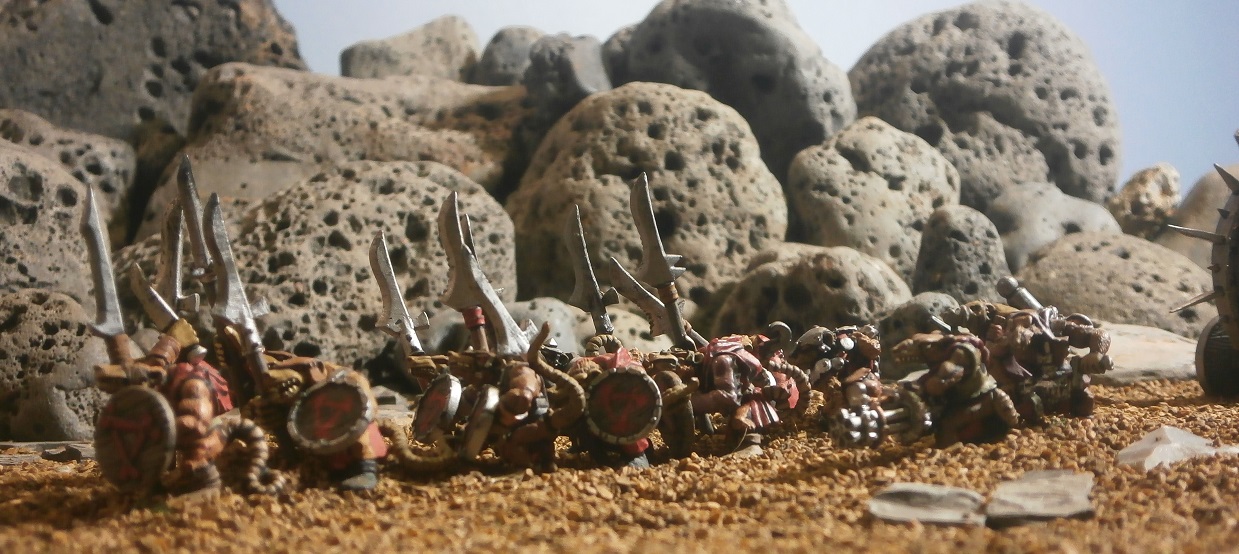
… and another lot behind.
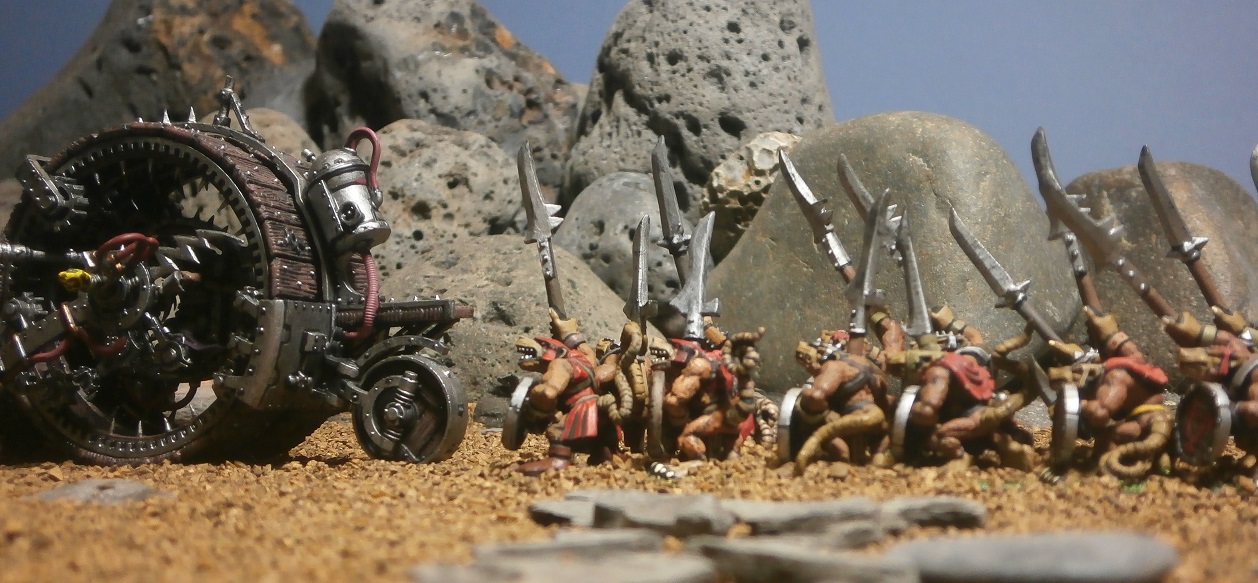
“You did not witness-see the changing?” asked the other.
“What changing?”
“Yes, the changing. You must have been labour-working, up ahead clearing away the tangle-mass or the shattered shards of dripping rocks. These are not the guards we began the journey with.”
Fricknar knew he was exhausted and distracted, but he had not realised just how much he had failed to notice. Yet, he thought, his point still stood.
“Then I ask, these-here new guards, why are they not dead?”
“Hush! They will be soon enough. If there are no more changings, some perhaps will die before we arrive at Foul Peak. They have only lasted this long because we have not stopped.”
“No, wait,” demanded Fricknar, having spotted a flaw in the other’s arguments. “I know there is little truth-sense in your words. Those two, there, with the rattler, they have been here with us from the start. They have no robes or masks.”

“But they always scuttle-run ahead, as ordered, never behind, never in the engine’s wake-trail. This buys them time. Remember how they were on the first day? Yes? Look close now and you will see how they flag, how they stumble-stall. Look closer and you will see how their skin peels and their fur falls in lumps. Look into their eyes and you will see that death already tugs at their tails.”
Fricknar was getting frustrated by the frantic insanity of his companion’s words. Whatever answers they contained, there were always more questions. Even now, something bugged him.
“You say before we arrive at Foul Peak?” he asked. “How can we arrive if we cannot stop? How can our journey end? Are we to use this weapon against Foul Peak?”
“No, not there. Against the lord of Foul Peak’s enemies. Do you never listen-hear?”
“I will hear your answer,” said Fricknar, his anger momentarily mastering his fear. “How can we arrive at Foul Peak?”
“We shall arrive soon enough, but this does not mean we shall stop-stay, only pass through, there to be joined by more and others, to learn where we must go next, and so continue, on and on.”
This was impossible, thought Fricknar. He had a day left in him, perhaps another if his fear could dominate his pain to keep him on his feet.
“How can we continue?” he complained. “It is impossible! Our legs will be worn to nothing-nubs if we try.”
“All is prepared and arranged by our masters and the lord of Foul Peak,” said the other. “New attendants await the engine at the mountain. We will be allowed to rest-lie upon litters, to be carried on at some remove.”
“And then?”
“Then we will be command-ordered back to the engine. If we are fortunate-lucky we will be attending when it fires.”
“Lucky?” spat Fricknar. “How is there any good fortune in taking such a risk?”
“To watch it work. To see-witness a whole city killed or an entire army obliterated!”

...
Keep Going!
Somewhere in the mountains of north Tilea, Winter 2403-4
Fricknar had never in all his cruelty-filled life undertaken a journey as difficult as this. They were in such a hurry that they were not allowed to stop for more than a few moments at a time. So far, six nights and five days of almost perpetual motion, a relentless succession of step, step, step; eating, even excreting, on the move. Every now and again he would have to run ahead to shovel something quickly - filling a hole or flattening a lump. Invariably, just as he completed the labour, the trundling engine caught up he was required to move on again.

In his bones he knew that should he continue at this pace another day then it would also become the most painful time of his life, not just the hardest journey. He had been badly beaten three times as a pup, and on the last occasion, as he lay battered and dazed, another pup from his own litter had eaten one of his fingers! He had been wracked with a burning pain in his lungs for countless days when he took a mouthful of warpstone vapour after an manufactory accident. He had been imprisoned in a near airless cage for more than a week as punishment for an infraction he never understood, starved of food and nauseously dizzied by the swinging motion of the cage every time someone pushed it (which many did and often). Right now, his pain and anguish were building up to rival all those past experiences, and by tomorrow, would surely overtake them.
His last task had been to assess the quality of a warpstone batch being offered by a small clan who had acquired it by (the usual) nefarious means. It had been flawed, but still useful, and a price was offered. Before he learned whether the purchase was successful, however, he been ordered to return with all haste to the workshops. Immediately upon doing so, he was assigned this new task - no time for explanations, no rest nor repast, but straight to work.
By the end of the first day he realised he knew none of the engine’s other attendants. Since then there had been little chance to get to know them, what with the incessant motion. Escorting the engine was an all-encompassing task, leaving little time anything else. The tunnels they had travelled through, despite being large, had been irregularly proportioned, in both width and height, and the ground uneven, scattered with tumbled rocks from crumbling walls. Here and there, roots had penetrated the ceiling, and stalagmites and stalactites had been allowed to form along the dampest stretches. Sometimes there was a way around such obstacles, but often they had to be cleared – lifted, hacked or chipped away – and his shovel was a necessary part of nearly all these tasks.

Their orders were clear, and in no uncertain terms: the engine must not collide or scrape against anything, nor should it jolt more than a little, and it should certainly never be allowed to list or careen. Most importantly, it must never stop.
It was possibly the most demanding assignment ever given to anyone, anywhere, at any time.
For a little while he had occupied his mind with attempting to work out whether the attendant who invariably walked in front of the engine, clutching a staff tipped with what appeared to be a fine shard of warpstone …

… or the engine’s driver were responsible for setting the pace, whilst also taking on board the possibility the engine itself might be most to blame. Before he had come to a decision, however, distraction and exhaustion had shattered such trivial considerations.

Now, here in a mountain valley between two tunnel-stretches, on the widest path yet traversed, with no walls or ceiling to concern him, only the ground itself, Fricknar was able to loosen and lift his mask just a little to allow in a breath or two of fresh air, and at long last, he had the chance to talk.

He had questions to ask.
Turning to the attendant closest to him, a red-hooded fellow carrying a tubular locking tool which could loosen any of several bolts on the engine and in the other hand what appeared to be a small gear wheel (presumably ready to replace some potentially defective part) he said,
“I heard we have gift-given much and more to the lord of Foul Peak. Why give this also? Why more and more?”

“Not gifts, no,” said his companion in a whining voice muffled by his mask. “All and everything will be paid for.”
“That matters not,” said Fricknar.
“It matters a lot,” countered the other.
“Yes, yes, to our masters, to the clan. I know-understand,” said Fricknar. “I mean it matters not to what I ask-enquire. Why give him more? Why this most novel, expensive engine? I heard his army has yet to fight one-single battle. His warriors have neither proved themselves capable nor wanting. Yet we fetch-bring such a reinforcement. Why?”
“You do not know-understand what this can do. You did not slave-work on its construction.”
“No, not I,” Fricknar admitted. “I know the quality-worth of warpstone, and I can keep an engine on the move.” He waved his shovel as if to prove the point.
“You have never moved such a one as this.”
Despite having studied the engine on several occasions over the last days, for want of much else to look at during the few moments he had not needed to watch the road, Fricknar looked again.

“I see only a doomwheel, like many others, with a murdering piece fix-attached,” he said.
“Yes, yes, you see that,” scoffed the other. “But what murder this can do. This kills many and much more than anything we have yet made. This might perhaps kill more than any single weapon has ever-ever killed!”
Fricknar looked at the engine again.

“It throws a bomb, yes?” he asked.
“Oh yes,” said the other. “A bomb. One bomb.”
“A poisoned-wind grenado?”
“It throws poison-death, yes, but not wind-vapours. The bomb inside is a thick shell of perfect-pure warpstone, two half-pieces fastened tight-together, and inside that inside is the finest ground-powdered warpstone, the making of which killed many hundred slaves, admixed with black powder in exact and most potent proportion-measure; precise and finely fused to explode the merest moment before touching the ground, which it must-must do, to release flesh-burning death to wash for a hundred and more chebels in each and every direction.”
“Warp-fire?”
“Yes, at first, but then much farther, a pure and poisonous etheric heat, burn-scalding all and only living flesh to a blistered crisp.”
Fricknar fell silent for a while. He had to think this through, for what he had heard did not sit well with his past experiences. Not well at all.
“Precise and finely fused, you spoke-said?” he asked.
“Yes, yes,” said the other. “Most and definitely very necessary.”
“And if, despite your careful care, it explodes too too soon?”
“Think, fool!” said the other, with a snarling hiss Fricknar could sense despite the mask and hood hiding his companion’s face.
He did not need to think. “Too too soon,” said Fricknar, “and we die too.”
“Yes!” said the other, loudly. “If even only a little too soon, then it will not be where we need-want it to be. It must be at the heart of the city. A moment too late and too much heat will pierce the ground - wasteful, for you cannot kill what is already dead.”
“This kills a city?”
“A city. An army,” said the other, a note of arrogant, easy pride in his voice. “Perhaps more?”
Fricknar’s fearful apprehension was now transforming into admiration. Then something occurred to him.
“Where are the bombs?” he asked.
“Are you deaf? Do you not listen-hear?” mocked the other. “You mean where is the bomb?”
Fricknar did not understand. Was that not what he had asked? There was just the engine, no carriage, wagon or slaves to bear a limber of any kind. He had absently assumed that the ammunition must already be at their destination, but hearing his companion’s description suggested such a cargo would be too rare and precious to be merely stockpiled elsewhere.
“The bomb,” said the other, emphasising the singularity, “is inside. It broil-brews, always and now, growing more and more potent by the hour. To haul-carry it separately would mean by the time we tried to load it into the engine all who came near-close would die immediate-quickly.”
This made no sense to Fricknar. “But we are nearby, and for days?”
“Yes, yes. The iron barrel enclosing it is thick-strong and inscribed inside with most potent-effectual sigillic wards, perfectly carved.”

Fricknar could imagine the carver squirming inside the barrel to carve such sigils - a suffocating, claustrophobic trial undoubtably far worse than his time in the cage.
“Could not a container-chest be made with such thickness or more?” he asked. “Such sigils? And better sealed tight-secure?”
“Yes, yes it could. No doubt. More easily made. More safely carried. But think, to load the murdering piece we would have to remove the bomb from the chest after it had broil-brewed for the whole journey. Impossibly intolerable.”
“Could slaves not be ordered to do so? Or some monstrous creation of Clan Moulder?”
“No, no, never. They would die the very instant the chest was breached.”
Fricknar glanced back at the engine.
“And dead slaves and ogres cannot load anything,” he said almost to himself. Then, louder, he asked, “So the sigil-wards prevent all harm leak-spilling out?”
“Not all, no,” said the other, as if it were obvious.
Of course, Fricknar should have known this. He pulled his loosened mask tight again, immediately regretting every breath of ‘fresh’ air he had taken. No skaven workshop ever made anything completely safe. The ever-present fear of punishment meant there was always haste as corners were cut, mistakes were inevitably concealed, and tests were deemed a pointless exercise when something was already completed. If it is built, use it! Worse still, most engines were made before the principles were even fully understood, so that the very design had flaws before even the first component part was assembled. None of those who invented or fashioned such engines cared a jot for the fate of those who would be ordered to use them; besides, once one engine was taken, they were immediately busy with the next, then the next.
“It is impossible to prevent it all, for it is far too potent, and grows ever more so,” the other continued. “Why do you think the engine never stops? It cannot be allowed to. If it did then too, too much of its etheric heat would concentrate-congeal in one single place. Then there would be none left to move it.”
Fricknar was confused again. “We have our masks, our waxed robes, our cylinder-filters, yes. But look here, these clanrats, they have guard-escorted us so, so far, even through the long tunnels. Why are they not dead or dying?”
There were two bands of guards, one marching before the engine, which included a weapons team armed with a rattling gun …

… and another lot behind.

“You did not witness-see the changing?” asked the other.
“What changing?”
“Yes, the changing. You must have been labour-working, up ahead clearing away the tangle-mass or the shattered shards of dripping rocks. These are not the guards we began the journey with.”
Fricknar knew he was exhausted and distracted, but he had not realised just how much he had failed to notice. Yet, he thought, his point still stood.
“Then I ask, these-here new guards, why are they not dead?”
“Hush! They will be soon enough. If there are no more changings, some perhaps will die before we arrive at Foul Peak. They have only lasted this long because we have not stopped.”
“No, wait,” demanded Fricknar, having spotted a flaw in the other’s arguments. “I know there is little truth-sense in your words. Those two, there, with the rattler, they have been here with us from the start. They have no robes or masks.”

“But they always scuttle-run ahead, as ordered, never behind, never in the engine’s wake-trail. This buys them time. Remember how they were on the first day? Yes? Look close now and you will see how they flag, how they stumble-stall. Look closer and you will see how their skin peels and their fur falls in lumps. Look into their eyes and you will see that death already tugs at their tails.”
Fricknar was getting frustrated by the frantic insanity of his companion’s words. Whatever answers they contained, there were always more questions. Even now, something bugged him.
“You say before we arrive at Foul Peak?” he asked. “How can we arrive if we cannot stop? How can our journey end? Are we to use this weapon against Foul Peak?”
“No, not there. Against the lord of Foul Peak’s enemies. Do you never listen-hear?”
“I will hear your answer,” said Fricknar, his anger momentarily mastering his fear. “How can we arrive at Foul Peak?”
“We shall arrive soon enough, but this does not mean we shall stop-stay, only pass through, there to be joined by more and others, to learn where we must go next, and so continue, on and on.”
This was impossible, thought Fricknar. He had a day left in him, perhaps another if his fear could dominate his pain to keep him on his feet.
“How can we continue?” he complained. “It is impossible! Our legs will be worn to nothing-nubs if we try.”
“All is prepared and arranged by our masters and the lord of Foul Peak,” said the other. “New attendants await the engine at the mountain. We will be allowed to rest-lie upon litters, to be carried on at some remove.”
“And then?”
“Then we will be command-ordered back to the engine. If we are fortunate-lucky we will be attending when it fires.”
“Lucky?” spat Fricknar. “How is there any good fortune in taking such a risk?”
“To watch it work. To see-witness a whole city killed or an entire army obliterated!”

symphonicpoet
Moderator
The Manratton project indeed! I am clearly insufficiently familiar with the rat-kin. I had no idea . . .
Well played sir! And very well written!
Well played sir! And very well written!
Caradepato
Vassal
This campaign is great - a true achievement. I've seen you post in several places around the internet for quite some time now, but only found my way to this thread yesterday, and so I've binge read the whole thing. Im jealous of your players, being able to participate in something like this.
Lands Annex
Vassal
Brilliant!
Cannot wait to see how this thread of the tale goes.
Cannot wait to see how this thread of the tale goes.
Caradepato
Vassal
Looking forwards to it!
Padre
Lord
A Letter from Antonio Mugello to the most noble Barone Iacopo Brunetti, Regent of Verezzo
As I wrote unto my beloved Lord Lucca (may he sit beside Morr in the garden of eternal summer) to impart what little I had learned of events throughout Tilea, so humbly I send this missive to you. My love for Lord Lucca and my loyalty to Verezzo are now offered to you, noble lord, for you have been a faithful servant of the first and have become the guardian of the latter.
I have been lodged in Remas throughout the winter, a place most conducive to the garnering of knowledge concerning the whole of Tilea. Sometimes I witness the events themselves. A month ago, I myself witnessed the arrival of the army of the VMC, led by General Valckenburgh, who had given up the siege of Pavona. I know not what you have heard concerning the VMC but presume that Duke Guidobaldo’s accusation that they were behind Lord Lucca’s murder and the looting of Spomanti must be painfully well known to you. From what I have learned, my lord, it seems to be generally accepted, at least here in Remas, that Duke Guidobaldo lied, and was himself responsible for the unforgiveable deed. My Lord Lucca warned me on several separate occasions concerning Duke Guidobaldo’s duplicitousness, and it gives me nothing but great sadness to know that his words are - post mortem - further proof of his great wisdom. Furthermore, in the last missive I received from my Lord Lucca he informed me that he had met with General Valckenburgh and found him to be a most honourable officer, who had marched north out of an earnest desire to assist in the defeat of the terrible foe. Lord Lucca was rarely, if ever, mistaken in his judgement of another, and I can see no reason to suppose he was mistaken regarding the general.
This, of course, explains recent events, most obviously General Valckenburgh’s siege of Pavona. He must have been furious to be slandered in such a way – angry enough to lure him from his march north to face the vampires threatening every living soul in Tilea. I have heard some in Remas voice their confusion as to why Valckenburgh did not complete what he had begun at Pavona, for Guidobaldo’s actions and subsequent lies were no less than a declaration of war, but (if you will allow me to offer mine own humble opinion) the answer seems clear to me. While we, who have suffered the loss of our dear lord at the Pavonan duke’s hands can feel only an enduring, righteous anger, General Valckenburgh personally suffered slander alone, and as his fury had time to subside (as ours can never do) he must have decided that the pursuit of satisfaction regarding what in another time would be a serious matter, seemed relatively petty in light of the great threat offered by the vampire duchess.
And so it is that Valckenburgh’s army is now camped here in the realm of Remas, apparently intending to rest a while. Perhaps they are waiting for Spring before recommencing their march? Or their halt might well be part of some grand strategy jointly agreed by the arch-lector of Morr, Lord Alessio Falconi and General Valckenburgh? I cannot know. It does strike me, and others too, as odd that Valckenburgh has now allowed himself to be delayed yet again, having only just overcome the anger that previously delayed him. Some say he is too easily distracted, but I believe, considering that which I am yet to relate to you, that he has more material concerns to factor in to his strategies, such as the reports of ratto-uomo forces and tunnel mouths north of the Trantine Hills, as well as the razing of Luccini and kidnapping of King Ferronso by the pirates of Sartosa.
By your leave, noble Barone, I will attempt to address these concerns, and more, in turn.
It is now commonly known in Remas that the ratto uomo are once again stirring in Tilea, what with Lord Alessio’s army discovering several entrances to huge tunnels north of the Trantine Hills, and even sighting verminous forces marching above ground. I cannot know what was said in the official missives, nor even if much more detail was contained therein, but enough Reman soldiers marching with Lord Alessio have sent word to their families and friends for the news to have spread. Perhaps unsurprisingly, knowing the cowardly nature of the ratto uomo (unless amassed in great strength) those forces fled back into the tunnels to avoid giving battle. Yet, the fact that they are openly active has begun to cause considerable consternation in a city with a somewhat chequered history of dealing with the verminkind. It has long been presumed in Tilea that ratto uomo always lurk in the shadows, whispering manipulative lies, stealing valuables, sewing discord and disease. Some say that all those who dwell within a city’s walls are never more than two dozen yards from a rat-man! But it has been many a decade since verminkind have marched in strength within sight of men rather than concealed underground or in barren places while embroiled in their interminable civil wars.
Continued after the following story
………………………………………………………………
Such a Shame-Waste!
Somewhere in Tilea, End of Winter, IC 2403-4

In the night’s quietest hour, in the city’s loneliest corner, several assassins, sharp of tooth and claw, were inspecting their work.
“A job very well done, master, yes?” said one, still clutching the heavy blade he had pommelled one of their victims with before strangling the man.
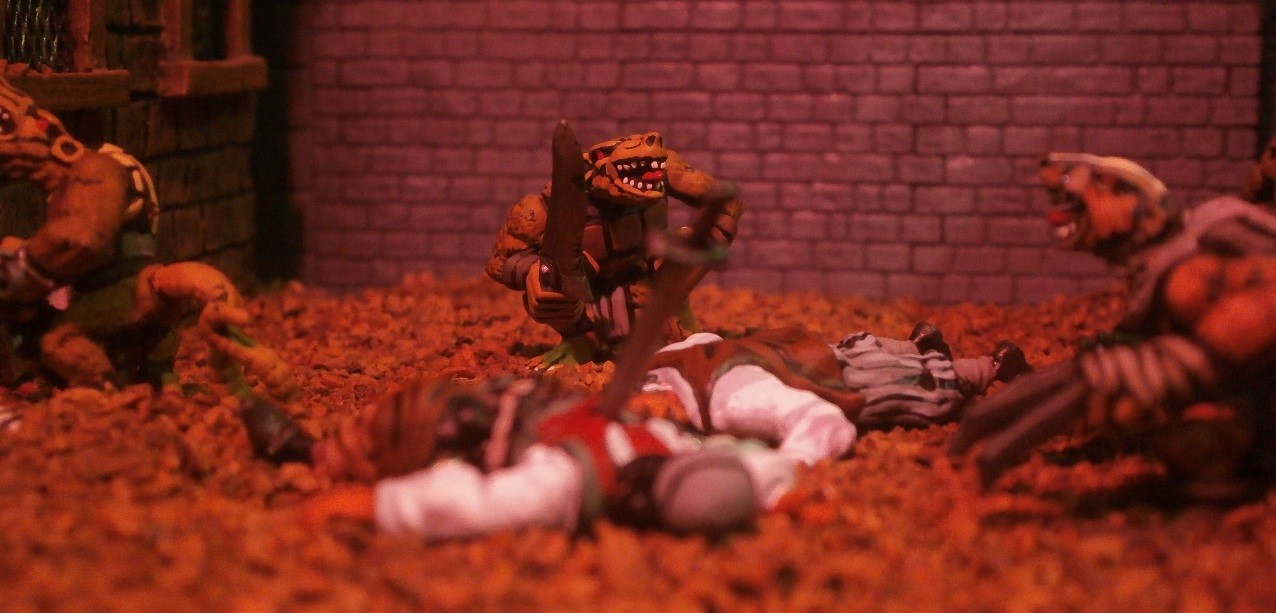
“They are dead,” said the master. “Which was our aim-desire, so yes, if it pleases you, heap congratulations where and how you like. But this here is nothing but a beginning-start. Here lie the foundations of that which we shall make-forge. No, not that … the first cracks in that which we will destroy. Yes, that’s better.”
The first looked at the sword now prominently lodged in the other corpse, his eyes then flicking to scrutinise the ragged edge of his own blade.
“Master,” he said, “forgive, but that blade is good and sharp - such a shame-waste to leave it here.”
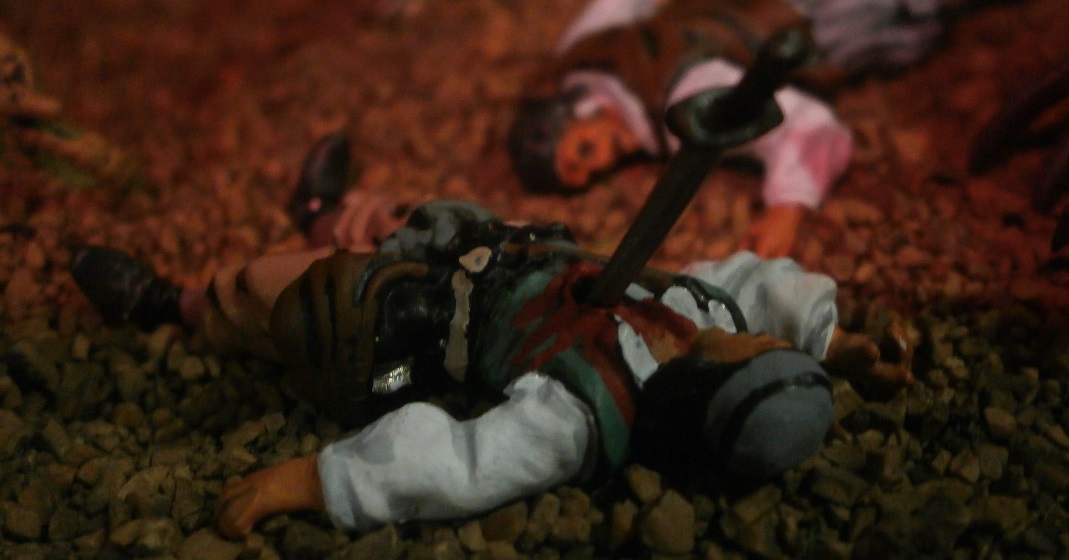
“The sword stays. We must-need ensure the menthings think-believe their own kind did this.”
“Yes, not us, never us,” hissed the first. He prodded his own victim with his taloned foot. “Yet master, a mere-nothing thought, but this one here has a knife. Would that not suit-satisfy?”
The master seemed to have a mind to be generous.
“It might just do,” he agreed. “But no, I like the sword. It draws the eye. A knife is but a small thing and gives but small ideas - the tool of petty-squabbling thieves, too easily dismissed as bloody vengeance between the basest of men-things. This sword tells another story, for it is the kind the men-thing guards carry. Let their captains think-believe their own guards bear the blame for this naughtiness.”
“So very clever master, yes. Yet could not a soldier dispatch-kill such as these and be proud, boasting of his most satisfactory work?”
“A soldier might boast, had any one of them done this,” said the master.

“But none of them did, and so none will make such a claim. Then the captains will think-believe their command-control is weak, and that they know not what their own soldiers do.”
“Yes, Master,” said the first, finally giving up on his petty quest to obtain the sword.
“Now,” ordered the master, “look and look again. Make certain-sure there is no sign of our presence here.”
The first looked at the corpses and then around them.
“There was only your throwing star where now instead the sword is stuck-pierced,” he said. “This man-thing I squeeze-strangled, and he but scrape-scratched at me, pathetic-weak.”
“Look again, make certain-sure,” commanded the master. “Nothing dropped. No fur under his nails. No paw print marking the ground.”
The first hunched down and looked closer. He was getting nervous, as could be seen from the raised fur on the back of his neck.
“Master, forgive, but do we not linger-stay here too long?” he asked. “If the men-things come they will see us ourselves, not just that we leave-drop behind, and they will know all.”
“Hush-quiet,” snapped the master. “I am no half-wit fool. I chose this spot. I chose this time. No-one will come. Four nights this place was quiet-empty. Besides, look, look,” he gestured at the guards stationed all around them, “we have eyes to see and ears to hear all around.”
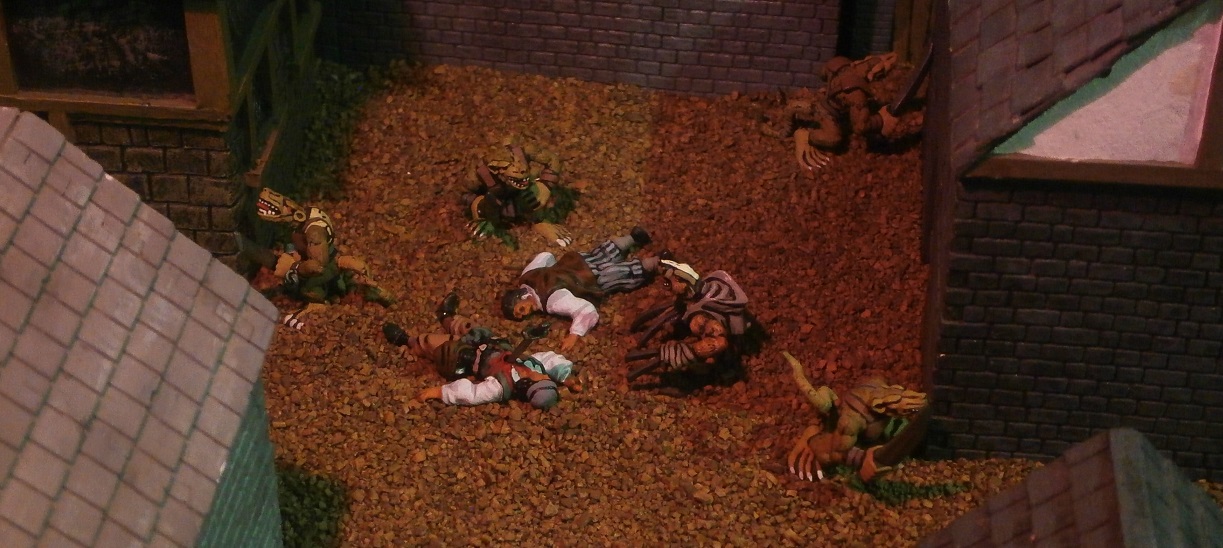
“If anyone approaches,” the master continued, “we shall know in plenty-enough time to make our escape. Now, make haste, and be sure there no sign-clue of our presence.”
………………………………………………………………
Antonio Mugello’s letter continued
On more than one occasion I have heard it voiced that this resurgence of the ratto uomo could spell the end of all civilisation in Tilea, for if this is a new offensive, then it has begun just as the whole peninsula lies exhausted and weakened by the ongoing war against the vampires, having only recently emerged from several conflicts – the War of the Princes, the scattering of Khurnag’s Waagh and a veritable battering at the hands of Boulderguts’ brutes. There simply might not be sufficient strength remaining in Tilea to resist the ratto uomo hordes. Fearful rumours are rife concerning what diseases they might already be spreading, who they are about to assassinate, and which foolish rulers they have lured into a false alliance? In Remas, the memory of arch-lector Ordini’s ignominious deal remains a scab upon the city’s reputation. Is it any surprise the Remans are openly asking which madman has called upon the verminkind’s aid, perhaps hoping to attain the upper hand in some petty squabble, to gain vengeance or to retrieve some lost power? Since time immemorial there have always been fools who believe they can benefit from such a foul alliance.
I myself have heard a myriad of theories and list the following not merely to repeat malicious gossip nor to revel in rumour, but to give the mind of the people, as it may contain more than one kernel of truth. I will address some of the most likely first, in that they concern wicked powers who would feel no compunction at allying with the likes of the ratto oumo.
Have the Sartosans made an agreement of some sort? Would such sea dogs baulk at the idea of sharing the spoils with sewer rats, if not to do so could mean no spoils at all? The very fact that both appeared at one and the same time seems in itself to link them. Just as the Sartosans ravaged Luccini, the ratto uomo appeared skulking at new tunnel mouths, so that those in between could not know which way to look! If divided, we may well be more easily conquered or robbed.
Has the vampire duchess, now hard-pressed by the gathering armies of Tilea, offered the ratto uomo some portion of the peninsula in return for luring away the armies currently threatening her? I do not pretend to know the mind of a vampire, and despite the noble trappings and haughty demeanour many adopt, I cannot dismiss the possibility that they might stoop so low as to bargain with verminkind. There seems to be no wickedness that vampires are not capable of, and thus only their evil pride might dissuade them. Much is known of Duchess Maria in life, but all we can know now is that in undeath she is surely not at all the same. Anyone who surrounds themselves with a putrid court of rotting corpses cannot be so particular as to refuse to meet with flea-ridden vermin.
Several noblemen (of which there are not that many in Remas since the uprisings) have suggested that the VMC, ruled by greed alone, has signed a secret contract in which they carve up Tilea between themselves and the verminkind - the VMC to rule the south while the ratto-uomo ruin the north. I heard one signore say this would explain why the army of the VMC has marched north so leisurely, allowing itself to be easily distracted. It may well be to their advantage that Lord Alessio’s Portomaggioran and Reman army bears the brunt of the fight against the vampire duchess, for then both Portomaggiore and the Remas can be all the more easily subdued afterwards. Furthermore, claimed the nobleman, the real reason General Valckenburgh lifted the siege or Pavona was because he saw such a ruined realm as a waste of effort, and wanted to keep his army strong to defeat the weakened Portomaggioran and Reman armies, then to seize much richer realms instead. I can say that I saw real fear in the eyes of those who listened to this signore’s words, for all must have suddenly suspected the army of the VMC’s prolonged encampment at Remas was nothing more than an opportunity to rest and reconnoitre before seizing the city for themselves. Those fearful people had not Lord Lucca’s wise counsel to guide them, but of course, had I spoken my mind, then as a Verezzan rebutting a Reman gentleman, they would not have heard me.
I even heard one fellow, Pavonan by his accent, say that the dwarfen king in the mountains has made a pact with the verminkind, to bring about an end to their meddling in the dwarfs’ mines. I voiced my doubt, telling the man that the dwarfs of Karak Borgo have always craved trade, and the sort of destruction the ratto uomo cause would not be at all conducive to such. He just laughed, saying that would be presuming the king of the dwarfs is in command of his wits, whilst his companion spat and declared no dwarf could be trusted.
Mention of these Pavonans brings me to a matter I must address, but I would first have you know that I have attempted to consider this dispassionately, as would an entirely uninterested observer, despite the fact that it concerns the murderer of our beloved master.
I have no doubt that the following intelligence is known to you, what with your closer proximity to Pavona, but it is clear that Duke Guidobaldo’s realm has suffered dreadfully during the winter, both due to its precarious state after being ravaged by the ogres and then as a consequence of the army of the VMC’s siege. Duke Guidobaldo’s own army is said to be fragmenting – indeed only yesterday I saw with mine own eyes some of Reman bravi who marched away with the Pavonans (to become notorious for the raid on Spomanti), back here upon the streets of Remas. Such mercenary bravi could hardly be expected to honour their contract with Pavona when there is nothing but misery and hunger for them there. The Pavonan people are now sadly starving, for the duke took food from them to feed his soldiers. Furthermore, he has defaulted on so many loans over the last years that not one banking family is prepared to do business with him, and traders demand payments of gold in advance. What will come of all of this, I know not. Possibly his own subjects will revolt, turning against him, or perhaps he will resort again to acts of piracy and murder? Maybe his realm will simply diminish and fade into obscurity?
Or, and this is what plagues my nightmares, perhaps he thinks to regain his power and wealth by means of a verminous pact? Could it be that Duke Guidobaldo of Pavona - desperate as he is, humiliated, his pride in shatters, his realm suffering, known to be capable of such lies and treachery as would put the ratto uomo to shame - could it be that it was he who summoned the verminkind?
Of course, as yet it is unknown whether the ratto uomo will indeed amass in any strength; nor whether they intend a minor interference or a major incursion; nor whether they have in mind the destruction of the whole of Tilea of just some part thereof.
What is known for certain, however, is that the Vampire Duchess has yet to be defeated. Twice before she has sent armies south of Ebino, and it has taken battle after battle to prevent her further advance. Her aggressiveness is proven – if she is not destroyed then she will almost certainly send forth her armies again and again until she has the whole peninsula beneath her foul feet.
All the reports coming from the Reman soldiers under Lord Alessio’s command agree that Duchess Maria once again resides in Ebino. The walled and moated city teems with her undead servants. Every tower parapet is guarded by unblinking eyes. Every tomb, grave and burial pit in Ebino and Miragliano lies empty, the occupants now busied in the duchess’s service.
Continued after the following story, which is in the next post!
As I wrote unto my beloved Lord Lucca (may he sit beside Morr in the garden of eternal summer) to impart what little I had learned of events throughout Tilea, so humbly I send this missive to you. My love for Lord Lucca and my loyalty to Verezzo are now offered to you, noble lord, for you have been a faithful servant of the first and have become the guardian of the latter.
I have been lodged in Remas throughout the winter, a place most conducive to the garnering of knowledge concerning the whole of Tilea. Sometimes I witness the events themselves. A month ago, I myself witnessed the arrival of the army of the VMC, led by General Valckenburgh, who had given up the siege of Pavona. I know not what you have heard concerning the VMC but presume that Duke Guidobaldo’s accusation that they were behind Lord Lucca’s murder and the looting of Spomanti must be painfully well known to you. From what I have learned, my lord, it seems to be generally accepted, at least here in Remas, that Duke Guidobaldo lied, and was himself responsible for the unforgiveable deed. My Lord Lucca warned me on several separate occasions concerning Duke Guidobaldo’s duplicitousness, and it gives me nothing but great sadness to know that his words are - post mortem - further proof of his great wisdom. Furthermore, in the last missive I received from my Lord Lucca he informed me that he had met with General Valckenburgh and found him to be a most honourable officer, who had marched north out of an earnest desire to assist in the defeat of the terrible foe. Lord Lucca was rarely, if ever, mistaken in his judgement of another, and I can see no reason to suppose he was mistaken regarding the general.
This, of course, explains recent events, most obviously General Valckenburgh’s siege of Pavona. He must have been furious to be slandered in such a way – angry enough to lure him from his march north to face the vampires threatening every living soul in Tilea. I have heard some in Remas voice their confusion as to why Valckenburgh did not complete what he had begun at Pavona, for Guidobaldo’s actions and subsequent lies were no less than a declaration of war, but (if you will allow me to offer mine own humble opinion) the answer seems clear to me. While we, who have suffered the loss of our dear lord at the Pavonan duke’s hands can feel only an enduring, righteous anger, General Valckenburgh personally suffered slander alone, and as his fury had time to subside (as ours can never do) he must have decided that the pursuit of satisfaction regarding what in another time would be a serious matter, seemed relatively petty in light of the great threat offered by the vampire duchess.
And so it is that Valckenburgh’s army is now camped here in the realm of Remas, apparently intending to rest a while. Perhaps they are waiting for Spring before recommencing their march? Or their halt might well be part of some grand strategy jointly agreed by the arch-lector of Morr, Lord Alessio Falconi and General Valckenburgh? I cannot know. It does strike me, and others too, as odd that Valckenburgh has now allowed himself to be delayed yet again, having only just overcome the anger that previously delayed him. Some say he is too easily distracted, but I believe, considering that which I am yet to relate to you, that he has more material concerns to factor in to his strategies, such as the reports of ratto-uomo forces and tunnel mouths north of the Trantine Hills, as well as the razing of Luccini and kidnapping of King Ferronso by the pirates of Sartosa.
By your leave, noble Barone, I will attempt to address these concerns, and more, in turn.
It is now commonly known in Remas that the ratto uomo are once again stirring in Tilea, what with Lord Alessio’s army discovering several entrances to huge tunnels north of the Trantine Hills, and even sighting verminous forces marching above ground. I cannot know what was said in the official missives, nor even if much more detail was contained therein, but enough Reman soldiers marching with Lord Alessio have sent word to their families and friends for the news to have spread. Perhaps unsurprisingly, knowing the cowardly nature of the ratto uomo (unless amassed in great strength) those forces fled back into the tunnels to avoid giving battle. Yet, the fact that they are openly active has begun to cause considerable consternation in a city with a somewhat chequered history of dealing with the verminkind. It has long been presumed in Tilea that ratto uomo always lurk in the shadows, whispering manipulative lies, stealing valuables, sewing discord and disease. Some say that all those who dwell within a city’s walls are never more than two dozen yards from a rat-man! But it has been many a decade since verminkind have marched in strength within sight of men rather than concealed underground or in barren places while embroiled in their interminable civil wars.
Continued after the following story
………………………………………………………………
Such a Shame-Waste!
Somewhere in Tilea, End of Winter, IC 2403-4

In the night’s quietest hour, in the city’s loneliest corner, several assassins, sharp of tooth and claw, were inspecting their work.
“A job very well done, master, yes?” said one, still clutching the heavy blade he had pommelled one of their victims with before strangling the man.

“They are dead,” said the master. “Which was our aim-desire, so yes, if it pleases you, heap congratulations where and how you like. But this here is nothing but a beginning-start. Here lie the foundations of that which we shall make-forge. No, not that … the first cracks in that which we will destroy. Yes, that’s better.”
The first looked at the sword now prominently lodged in the other corpse, his eyes then flicking to scrutinise the ragged edge of his own blade.
“Master,” he said, “forgive, but that blade is good and sharp - such a shame-waste to leave it here.”

“The sword stays. We must-need ensure the menthings think-believe their own kind did this.”
“Yes, not us, never us,” hissed the first. He prodded his own victim with his taloned foot. “Yet master, a mere-nothing thought, but this one here has a knife. Would that not suit-satisfy?”
The master seemed to have a mind to be generous.
“It might just do,” he agreed. “But no, I like the sword. It draws the eye. A knife is but a small thing and gives but small ideas - the tool of petty-squabbling thieves, too easily dismissed as bloody vengeance between the basest of men-things. This sword tells another story, for it is the kind the men-thing guards carry. Let their captains think-believe their own guards bear the blame for this naughtiness.”
“So very clever master, yes. Yet could not a soldier dispatch-kill such as these and be proud, boasting of his most satisfactory work?”
“A soldier might boast, had any one of them done this,” said the master.

“But none of them did, and so none will make such a claim. Then the captains will think-believe their command-control is weak, and that they know not what their own soldiers do.”
“Yes, Master,” said the first, finally giving up on his petty quest to obtain the sword.
“Now,” ordered the master, “look and look again. Make certain-sure there is no sign of our presence here.”
The first looked at the corpses and then around them.
“There was only your throwing star where now instead the sword is stuck-pierced,” he said. “This man-thing I squeeze-strangled, and he but scrape-scratched at me, pathetic-weak.”
“Look again, make certain-sure,” commanded the master. “Nothing dropped. No fur under his nails. No paw print marking the ground.”
The first hunched down and looked closer. He was getting nervous, as could be seen from the raised fur on the back of his neck.
“Master, forgive, but do we not linger-stay here too long?” he asked. “If the men-things come they will see us ourselves, not just that we leave-drop behind, and they will know all.”
“Hush-quiet,” snapped the master. “I am no half-wit fool. I chose this spot. I chose this time. No-one will come. Four nights this place was quiet-empty. Besides, look, look,” he gestured at the guards stationed all around them, “we have eyes to see and ears to hear all around.”

“If anyone approaches,” the master continued, “we shall know in plenty-enough time to make our escape. Now, make haste, and be sure there no sign-clue of our presence.”
………………………………………………………………
Antonio Mugello’s letter continued
On more than one occasion I have heard it voiced that this resurgence of the ratto uomo could spell the end of all civilisation in Tilea, for if this is a new offensive, then it has begun just as the whole peninsula lies exhausted and weakened by the ongoing war against the vampires, having only recently emerged from several conflicts – the War of the Princes, the scattering of Khurnag’s Waagh and a veritable battering at the hands of Boulderguts’ brutes. There simply might not be sufficient strength remaining in Tilea to resist the ratto uomo hordes. Fearful rumours are rife concerning what diseases they might already be spreading, who they are about to assassinate, and which foolish rulers they have lured into a false alliance? In Remas, the memory of arch-lector Ordini’s ignominious deal remains a scab upon the city’s reputation. Is it any surprise the Remans are openly asking which madman has called upon the verminkind’s aid, perhaps hoping to attain the upper hand in some petty squabble, to gain vengeance or to retrieve some lost power? Since time immemorial there have always been fools who believe they can benefit from such a foul alliance.
I myself have heard a myriad of theories and list the following not merely to repeat malicious gossip nor to revel in rumour, but to give the mind of the people, as it may contain more than one kernel of truth. I will address some of the most likely first, in that they concern wicked powers who would feel no compunction at allying with the likes of the ratto oumo.
Have the Sartosans made an agreement of some sort? Would such sea dogs baulk at the idea of sharing the spoils with sewer rats, if not to do so could mean no spoils at all? The very fact that both appeared at one and the same time seems in itself to link them. Just as the Sartosans ravaged Luccini, the ratto uomo appeared skulking at new tunnel mouths, so that those in between could not know which way to look! If divided, we may well be more easily conquered or robbed.
Has the vampire duchess, now hard-pressed by the gathering armies of Tilea, offered the ratto uomo some portion of the peninsula in return for luring away the armies currently threatening her? I do not pretend to know the mind of a vampire, and despite the noble trappings and haughty demeanour many adopt, I cannot dismiss the possibility that they might stoop so low as to bargain with verminkind. There seems to be no wickedness that vampires are not capable of, and thus only their evil pride might dissuade them. Much is known of Duchess Maria in life, but all we can know now is that in undeath she is surely not at all the same. Anyone who surrounds themselves with a putrid court of rotting corpses cannot be so particular as to refuse to meet with flea-ridden vermin.
Several noblemen (of which there are not that many in Remas since the uprisings) have suggested that the VMC, ruled by greed alone, has signed a secret contract in which they carve up Tilea between themselves and the verminkind - the VMC to rule the south while the ratto-uomo ruin the north. I heard one signore say this would explain why the army of the VMC has marched north so leisurely, allowing itself to be easily distracted. It may well be to their advantage that Lord Alessio’s Portomaggioran and Reman army bears the brunt of the fight against the vampire duchess, for then both Portomaggiore and the Remas can be all the more easily subdued afterwards. Furthermore, claimed the nobleman, the real reason General Valckenburgh lifted the siege or Pavona was because he saw such a ruined realm as a waste of effort, and wanted to keep his army strong to defeat the weakened Portomaggioran and Reman armies, then to seize much richer realms instead. I can say that I saw real fear in the eyes of those who listened to this signore’s words, for all must have suddenly suspected the army of the VMC’s prolonged encampment at Remas was nothing more than an opportunity to rest and reconnoitre before seizing the city for themselves. Those fearful people had not Lord Lucca’s wise counsel to guide them, but of course, had I spoken my mind, then as a Verezzan rebutting a Reman gentleman, they would not have heard me.
I even heard one fellow, Pavonan by his accent, say that the dwarfen king in the mountains has made a pact with the verminkind, to bring about an end to their meddling in the dwarfs’ mines. I voiced my doubt, telling the man that the dwarfs of Karak Borgo have always craved trade, and the sort of destruction the ratto uomo cause would not be at all conducive to such. He just laughed, saying that would be presuming the king of the dwarfs is in command of his wits, whilst his companion spat and declared no dwarf could be trusted.
Mention of these Pavonans brings me to a matter I must address, but I would first have you know that I have attempted to consider this dispassionately, as would an entirely uninterested observer, despite the fact that it concerns the murderer of our beloved master.
I have no doubt that the following intelligence is known to you, what with your closer proximity to Pavona, but it is clear that Duke Guidobaldo’s realm has suffered dreadfully during the winter, both due to its precarious state after being ravaged by the ogres and then as a consequence of the army of the VMC’s siege. Duke Guidobaldo’s own army is said to be fragmenting – indeed only yesterday I saw with mine own eyes some of Reman bravi who marched away with the Pavonans (to become notorious for the raid on Spomanti), back here upon the streets of Remas. Such mercenary bravi could hardly be expected to honour their contract with Pavona when there is nothing but misery and hunger for them there. The Pavonan people are now sadly starving, for the duke took food from them to feed his soldiers. Furthermore, he has defaulted on so many loans over the last years that not one banking family is prepared to do business with him, and traders demand payments of gold in advance. What will come of all of this, I know not. Possibly his own subjects will revolt, turning against him, or perhaps he will resort again to acts of piracy and murder? Maybe his realm will simply diminish and fade into obscurity?
Or, and this is what plagues my nightmares, perhaps he thinks to regain his power and wealth by means of a verminous pact? Could it be that Duke Guidobaldo of Pavona - desperate as he is, humiliated, his pride in shatters, his realm suffering, known to be capable of such lies and treachery as would put the ratto uomo to shame - could it be that it was he who summoned the verminkind?
Of course, as yet it is unknown whether the ratto uomo will indeed amass in any strength; nor whether they intend a minor interference or a major incursion; nor whether they have in mind the destruction of the whole of Tilea of just some part thereof.
What is known for certain, however, is that the Vampire Duchess has yet to be defeated. Twice before she has sent armies south of Ebino, and it has taken battle after battle to prevent her further advance. Her aggressiveness is proven – if she is not destroyed then she will almost certainly send forth her armies again and again until she has the whole peninsula beneath her foul feet.
All the reports coming from the Reman soldiers under Lord Alessio’s command agree that Duchess Maria once again resides in Ebino. The walled and moated city teems with her undead servants. Every tower parapet is guarded by unblinking eyes. Every tomb, grave and burial pit in Ebino and Miragliano lies empty, the occupants now busied in the duchess’s service.
Continued after the following story, which is in the next post!
